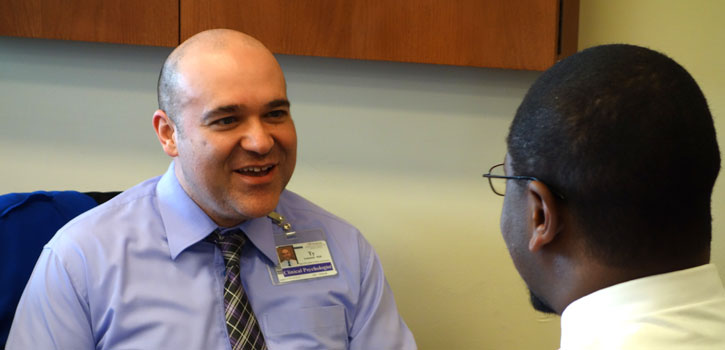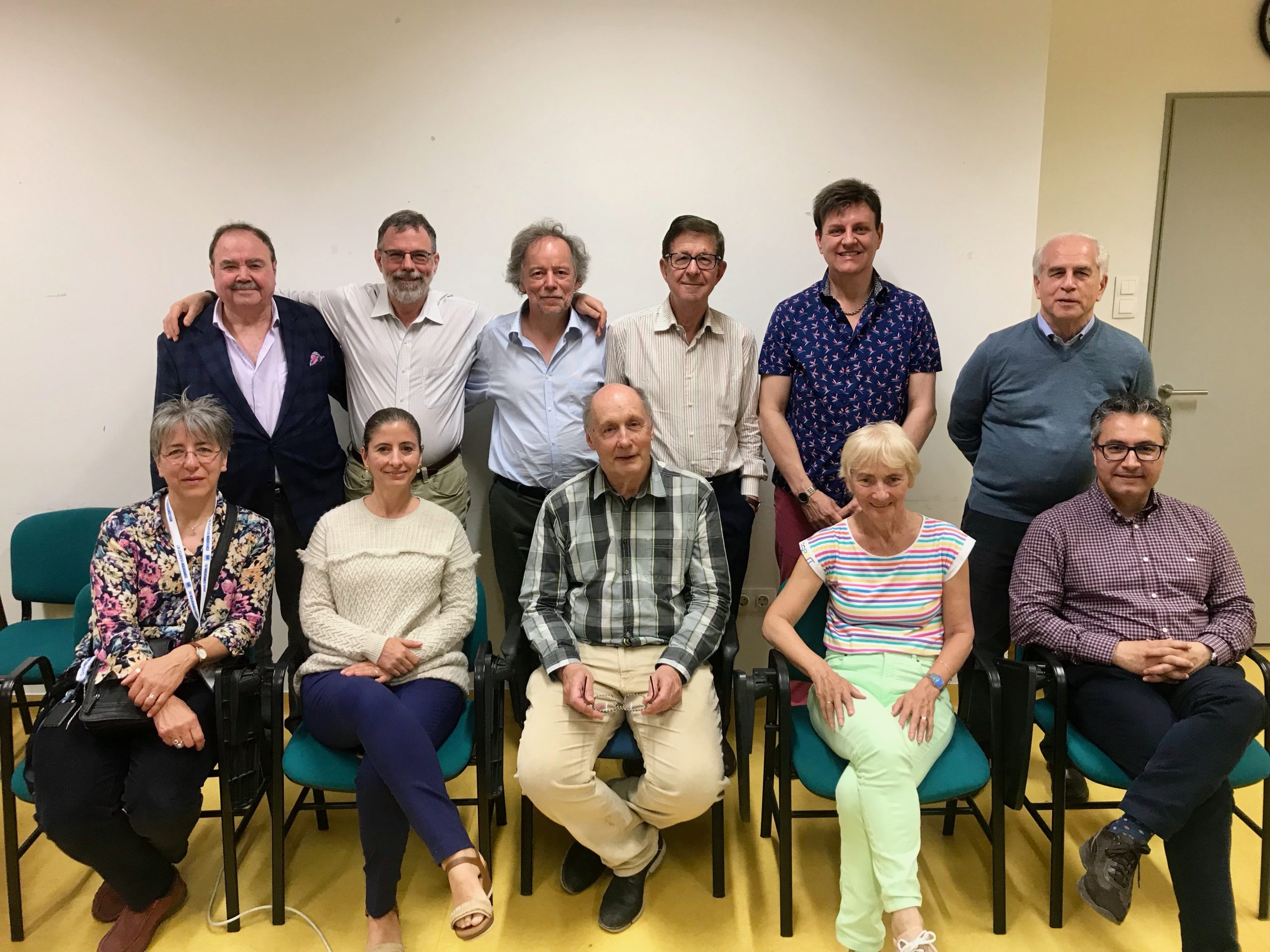Mark P. Jensen Ph.D.

Please call to schedule an appointment with this provider.

Medical Specialties
- Pain management
- Rehabilitation psychology
Patient Ratings and Reviews
Ratings are not available yet for this provider. A provider only displays ratings if they can be scheduled to be seen by patients and 30 or more ratings and reviews have been returned. Learn more
About Mark P. Jensen
Mark Jensen, Ph.D., is UW Medicine's vice chair for research in Rehabilitation Medicine and a UW professor of Rehabilitation Medicine As a clinician/scientist, Dr. Jensen has been developing and studying the efficacy of psychosocial pain treatments, and facilitating national and international workshops on these treatment approaches over three decades. In his clinical work, he combines cognitive-behavioral, hypnotic and motivational approaches to help patients better manage chronic pain and its effects on their lives. Dr. Jensen earned his Ph.D. at Arizona State. His research program focuses on the development and evaluation of measures of pain, pain beliefs and pain coping strategies, as well as on the development and evaluation of psychosocial pain interventions. His teaching activities focus on mentoring postdoctoral research fellows in the skills needed to develop a successful research career in rehabilitation science and the field of geriatric rehabilitation.
Education and Training
- Fellowship, 1990
- Arizona State University Medical Education, 1989, Medical Education
- Univ. of Washington, Psychology Internship Internship, 1988, Psychology
Mark Jensen , PhD
| Title | Professor |
|---|---|
| Division |
Mark Jensen, PhD, is a UW professor of Rehabilitation Medicine. Dr. Jensen earned his PhD at Arizona State. His research program focuses on the development and evaluation of measures of pain, pain beliefs and pain coping strategies, as well as on the development and evaluation of psychological pain interventions. His teaching activities focus on mentoring postdoctoral research fellows in the skills needed to develop a successful research career in rehabilitation science and the field of geriatric rehabilitation. He also facilitates workshops on the clinical applications of Hypnosis and Motivational Interviewing for pain mangement. He was the Editor-in-Chief for the Journal of Pain for 12 years from 2010 through 2022 and served as the president of the International Society of Hypnosis from 2021 through 2024. He has published over 700 articles and book chapters and 11 books on the topic of pain assessment and pain treatments.
Education and Training
- Arizona State University, PhD, 1989
- University of Washington, Clinical Psychology Internship, 1988
- University of Washington, Multidisciplinary Pain Center, Fellowship in Pain Management, 1990
Notable Awards and Honors
- Society of Clinical and Experimental Hypnosis Arthur Shapiro Award for Best Book on Hypnosis (2011)
- American Psychological Association Division 30 Award for Distinguished Contributions to Scientific Hypnosis (2012)
- American Pain Society Wilbert E. Fordyce Clinical Investigator Award (2014)
- Fellow, American Psychological Association (2018)
- International Association for the Study of Pain Honorary Membership (2020).
Recent Publications
MATCH Study UW
Meet the primary investigators, mark jensen, ph.d..
Mark Jensen, PhD is UW Medicine’s vice chair for research in Rehabilitation Medicine and a UW professor of Rehabilitation Medicine. Dr. Jensen earned his PhD at Arizona State. He is the author of over 500 articles in peer-reviewed journals, the author or editor of nine books, and the author of over 30 chapters on the topics of pain assessment and treatment. His research program focuses on the development and evaluation of measures of pain, pain beliefs and pain coping strategies, as well as on the development and evaluation of psychosocial pain interventions. His teaching activities include facilitating workshops to teach clinicians skills in the use of hypnosis, motivational treatments, and cognitive treatments for pain management, and in mentoring postdoctoral research fellows in their development of a successful research career in health psychology and rehabilitation science.
Leave a Reply Cancel reply
Your email address will not be published. Required fields are marked *
Save my name, email, and website in this browser for the next time I comment.
- Clinical Hypnosis Professionals
- ISH Members
- Register here
- Submit your documents
Mark P. Jensen
Department of rehabilitation medicine.
- President International Society of Hypnosis 2021
- PhD, Clinical Psychology, Arizona State University (1989).
- Professor and Vice Chair for Research, Department of Rehabilitation Medicine, University of Washington, Seattle, WA
- 2012-2018, Secretary/Treasure, International Society of Hypnosis
- 2003, APA Division 30 Award for Best Clinical Paper: Hypnosis for Clinical Pain
- 2004, Society of Clinical and Experimental Hypnosis Roy M. Dorcas Award for Best Clinical Paper: Hypnosis and Clinical Pain
- 2005, Society of Clinical and Experimental Hypnosis Presidential Commendation for Public Education
- 2008, American Society of Clinical Hypnosis Award of Merit, “…for extensive and ongoing research into chronic pain and the use of hypnosis in its treatment.”
- 2009, American Society of Clinical Hypnosis Clark L. Hull Award for Scientific Excellent in Writing on Experimental Hypnosis.
- 2010-Present, Editor-in-Chief, Journal of Pain.
- 2011 Society of Clinical and Experimental Hypnosis Arthur Shapiro Award for Best Book on Hypnosis, for Hypnosis for Chronic Pain Management: Therapist Guide.
- 2012, American Psychological Association Division 30 Award for Distingished Contributions to Scientific Hypnosis.
- 2014, American Pain Society Wilbert E. Fordyce Clinical Investigator Award.
- 2015, International Society of Hypnosis Jay Haley Early Career Award.
- 2016, Fellow, American Society of Clinical and Experimental Hypnosis.
- 2016, Society of Clinical and Experimental Hypnosis Hilgard Award for Best Theoretical Paper.
- 2018, American Psychological Association Division 30 Award for Distinguished Contributions for Professional Hypnosis.
- 2018-Present, President-Elect, International Society of Hypnosis
Author of over 500 articles and chapters, many on the efficacy and mechanisms of hypnosis treatments.
Author of Hypnosis for chronic pain management: Therapist guide, published by Oxford University Press.
Author of Hypnosis for chronic pain management: Workbook, published by Oxford University Press.
Editor of The art and practice of hypnotic induction: Favorite methods of master clinicians, published by Denny Creek Press.
Popular workshop facilitator on the use of hypnosis for (1) pain and symptom management and (2) patient empowerment for achieving health goals.

- ITHS SharePoint
Search the Site
Connect with us, need help have a question.
Contact the Research Navigator
ITHS Email Updates

Jensen, Mark
About this project.

Project: Towards the development of a sustainable and culturally appropriate chronic pain program for indigenous communities in the Pacific Northwest: Treatment preferences
Partner Organization: Portland Area Indian Health Service – Yakama Service Unit (YSU)
Internship Training Faculty
Adult Track | Autism and Development Disabilities Track Behavioral Medicaine and Neuropsychology Tracks | Child Track

Training Director
Ty w. lostutter, phd.
Chair: Steering Committee, Training Supervisor, Mentor, Didactics
Position: Associate Professor, Department of Psychiatry and Behavioral Sciences; Director of Training, Psychology Internship Program, Attending Psychologist at Fred Hutchinson Cancer Center Degree: Ph.D., 2009, University of Washington Clinical/Research : Addictions, Gambling, Substance Use, HIV, Global Mental Health, Prevention, College Students, Veterans, Asian/Asian Americans E-mail: [email protected] Phone: 206-543-0473 UWMC Profile: https://psychiatry.uw.edu/profile/ty-lostutter/ FHCC: https://www.fredhutch.org/en/provider-directory/ty-w-lostutter.html
Assistant Training Director
Katie wright, phd.
Training Supervisor, Mentor, Steering Committee
Position: Clinical Instructor, Department of Rehabilitation Medicine Degree: PhD, 2015, University of Maryland Baltimore County (UMBC) Clinical/Research : Chronic and acute pain management; Medical/rehabilitation psychology; Motivational Interviewing; Addiction and health behavior change; Multidisciplinary team coordination and care; Tailoring MI and brief interventions for use by other healthcare professionals. E-mail: [email protected]
Back to top of page
Adult Track Faculty
Adam carmel, phd – track coordinator.
Training Supervisor, Mentor, Didactics
Position: Clinical Professor, Department of Psychiatry and Behavioral Sciences Degree: PhD, 2012, CSPP Clinical/Research : DBT, suicidal behaviors, substance use disorders, implementation science E-mail: [email protected] Phone: 206-744-9693 UWMC Profile: https://psychiatry.uw.edu/profile/adam-carmel/
Nicole Bates, MD
Training Supervisor
Position: Attending Psychiatrist, Department of Psychosocial Oncology, Seattle Cancer Care Alliance Acting Assistant Professor, Department of Psychiatry and Behavioral Sciences, University of Washington School of Medicine Degree: MD, University of Washington School of Medicine, 2014 Clinical/Research : Psycho-oncology, psychiatry in palliative care, consultation-liaison psychiatry, collaborative care, psychotherapy E-mail: [email protected] UWMC Profile: https://psychiatry.uw.edu/profile/nicole-bates/
Michele Bedard-Gilligan
Position: Associate Professor, Departments of Psychiatry and Behavioral Sciences Degree: PhD, 2009, University of Washington Clinical/Research : mechanisms of recovery following trauma; treatment of PTSD and associated comorbidity; exposure therapy for anxiety; cognitive processing therapy E-mail: [email protected] Phone: 206-616-4215 UWMC Profile: https://psychiatry.uw.edu/profile/michele-bedard-gilligan/
Dror Ben-Zeev, PhD
Position: Professor, Department of Psychiatry and Behavioral Sciences; Director, UW BRiTE Center Degree: PhD, 2008, Illinois Institute of Technology Clinical/Research: Digital mental health interventions, mHealth, global mental health, Natural Language Processing (NLP) in the assessment and treatment of psychopathology, behavioral sensing technology, texting interventions, Ecological Momentary Assessment (EMA), serious mental illness E-mail: [email protected] UWMC Profile: https://psychiatry.uw.edu/profile/dror-ben-zeev/
Julia Brechbiel, PhD
Position: Attending Psychologist at Fred Hutch Cancer Center and Acting Assistant Professor in Department of Psychiatry and Behavioral Sciences Degree: PhD, 2021, Virginia Commonwealth University (VCU) Clinical/Research : Psycho-oncology, health and rehabilitation psychology, chronic and/or serious medical conditions, multidisciplinary and collaborative care, interpersonal and existential modalities of psychotherapy E-mail: [email protected] FHCC Profile: https://www.fredhutch.org/en/provider-directory/julia-brechbiel.html
Ben Buck, PhD
Training Supervisor, Didactics
Position: Assistant Professor, Department of Psychiatry and Behavioral Sciences Degree: PhD, 2018, University of North Carolina at Chapel Hill Clinical/Research: Schizophrenia-spectrum disorders; digital / mobile health interventions; early intervention for psychosis and associated risk states; paranoia; social cognition and metacognition; clinical training and supervision E-mail: [email protected] UWMC Profile: https://psychiatry.uw.edu/profile/benjamin-buck/
Jennifer Cadigan, PhD
Position: Assistant Professor, Department of Psychiatry and Behavioral Sciences Degree: PhD, 2016, University of Missouri Clinical/Research : prevention/intervention of high-risk substance use; co-occurring substance use and mental health; motivational interviewing; cognitive-behavioral therapy E-mail: [email protected] UWMC Profile: https://psychiatry.uw.edu/profile/jennifer-cadigan/
Susan Collins, PhD
Position: Professor, University of Washington, School of Medicine, Department of Psychiatry and Behavioral Sciences Degree: PhD, 2003, Syracuse University Clinical/Research : Addictive behaviors, Substance Use, harm reduction, mindfulness intervention, cognitive-behavioral treatment, motivational interviewing, co-occurring disorders, homelessness E-mail: [email protected] UWMC Profile: https://psychiatry.uw.edu/profile/susan-collins/
Kate Comtois, PhD
DBT Training
Position: Professor, Department of Psychiatry and Behavioral Sciences Degree: PhD, 1992, University of Maryland, College Park. MPH, 2009 University of Washington Clinical/Research : Health services, treatment development, and clinical trials research for suicidal behavior; implementation of evidence based practices for suicide prevention; increasing our understanding of these areas through better understanding of socio-cultural diversity including ethnicity, sexual orientation, and military populations E-mail: [email protected] Phone: 206-897-4225 UWMC Profile: https://psychiatry.uw.edu/profile/katherine-comtois/
Emily R. Dworkin, PhD
Mentor, Didactics
Position: Acting Assistant Professor, Department of Psychiatry and Behavioral Sciences Degree: PhD, 2016, University of Illinois Urbana-Champaign Clinical/Research : Trauma; sexual assault; co-occurring substance use and PTSD; early interventions; social support; web/app-based treatments E-mail: [email protected] UWMC Profile: https://psychiatry.uw.edu/profile/emily-dworkin/
Jesse Fann, MD, MPH
Mentor, Didactics
Position: Professor, Department of Psychiatry and Behavioral Sciences, UW SOM; Adjunct Professor, Department of Rehabilitation Medicine, UW SOM; Adjunct Professor, Department of Epidemiology, UW School of Public Health; Medical Director, Department of Psychosocial Oncology, Seattle Cancer Care; Alliance Affiliate Investigator, Clinical Research Division, Fred Hutchinson Cancer Research Center; Affiliate Faculty, Advancing Integrated Mental Health Solutions (AIMS) Center, UW; Associate Member, Harborview Injury Prevention & Research Center, UW Degree: BS, 1985, Electrical Engineering, Stanford University MD, 1989, Northwestern University School of Medicine Clinical/Research : Psycho-oncology, neuropsychiatry, mood disorders, clinical trials, health services research, psychiatric epidemiology E-mail: [email protected] Phone: 206-685-4280 UWMC Profile: https://psychiatry.uw.edu/profile/jesse-fann/ SCCA: https://www.seattlecca.org/providers/jesse-r-fann
Edward Goldenberg, PhD
Mentor, Diversity Advancement Committee
Position: Clinical Professor, Department of Psychiatry and Behavioral Sciences Degree: PhD, 1972, Oklahoma State University Clinical/Research : Mentally ill offenders in a correctional setting; teaching methods in psychology & law; psychopathology in community settings; cognitive behavioral therapy; forensic psychology; the effects of CBT and non-medical approaches with cancer patients E-mail: [email protected] Phone: 206-713-0122
Kevin A. Hallgren, PhD
Grant Writing Seminar, Mentor, Didactics
Position: Associate Professor, Department of Psychiatry and Behavioral Sciences Degree: PhD, 2014, University of New Mexico Clinical/Research: Alcohol and drug use disorder treatment, motivational interviewing, cognitive-behavioral therapy, technology in addiction/mental health treatment, statistical modeling and longitudinal data analysis E-mail: [email protected] Phone: 206-616-2906 UWMC Profile: https://psychiatry.uw.edu/profile/kevin-hallgren/
Mary Hatch, PhD
Position: Associate Professor, Addictions, Drug & Alcohol Institute, Department of Psychiatry & Behavioral Sciences. Attending Psychologist at UWMC-Outpatient Psychiatry Clinic and Researcher at UW Addictions, Drug & Alcohol Institute (ADAI) Degree: PhD, 2002, University of Nebraska-Lincoln Clinical/Research: Attending Psychologist at OPC focusing on substance use disorder treatment, cognitive behavioral therapy, depression, anxiety. Research interests include the intersection of substance use and HIV prevention, overdose prevention, clinical trials, sexual risk, harm reduction. E-mail: [email protected] UWMC Profile: https://psychiatry.uw.edu/profile/mary-hatch/
Sarah Kopelovich, PhD
Position: Assistant Professor, Department of Psychiatry and Behavioral Sciences Degree: PhD, 2015, City University of New York Clinical/Research: schizophrenia spectrum disorders; CBT for psychosis; dissemination and implementation; serious mental illness; mental health workforce development; first episode psychosis; forensic psychology E-mail: [email protected] Phone: 206-221-1218 UWMC Profile: https://psychiatry.uw.edu/profile/sarah-kopelovich/
Mary Larimer, PhD
Grant Writing Seminar, Mentor
Position: Professor, Department of Psychiatry and Behavioral Sciences, Professor, Psychology Degree: PhD, 1992, University of Washington Clinical/Research : Prevention and treatment of addictive and compulsive behaviors E-mail: [email protected] Phone: 206-543-3513 UWMC Profile: https://psychiatry.uw.edu/profile/mary-larimer/
Kristen Lindgren, PhD
Training Supervisor, Mentor
Position: Professor & Co-Director, Trauma Recovery Innovations , Department of Psychiatry and Behavioral Sciences Degree: PhD, 2006, University of Washington; ABPP in Cognitive Behavioral Therapy, 2014 Clinical/Research: Evidence based treatments for PSTD, anxiety, and mood disorders; self, identity, & implicit cognition related to substance use and trauma E-mail: [email protected] Phone: 206-685-8083 UWMC Profile: https://psychiatry.uw.edu/profile/kristen-lindgren-2/
Barbara McCann, PhD
Position: Professor, Department of Psychiatry and Behavioral Sciences Degree: PhD, 1984, Rutgers University Clinical/Research : Hypnosis, Cognitive Behavior Therapy, Motivational Interviewing, Third Wave Therapies E-mail: [email protected] Phone: 206-744-4544 UWMC Profile: https://psychiatry.uw.edu/profile/barbara-mccann/
Mandy Owens, PhD
Position: Research Scientist, Alcohol & Drug Abuse Institute; Affiliate Assistant Professor, Department of Psychology Degree: PhD, 2016, University of New Mexico Clinical/Research : Alcohol and drug use treatment; co-occurring substance use and mental health; motivational interviewing; cognitive behavioral therapy; individuals involved with the criminal legal system; working with community agencies E-mail: [email protected] UWMC Profile: https://adai.uw.edu/staff_members/mandy-d-owens/
Jon Reeves, PhD
Position: Acting Assistant Professor, Department of Psychiatry and Behavioral Sciences Degree: PhD, 2021, University of California, Berkeley Clinical/Research : Evidence-based treatment of PTSD; dialectical behavior therapy; DBT-PE; complex trauma; racism-based and other identity-based trauma; individualized case-formulation-based cognitive behavioral therapy E-mail: [email protected]
Joan M. Romano, PhD
Training Supervisor, Steering Committee
Position: Professor, Department of Psychiatry and Behavioral Sciences Degree: PhD, 1982, University of Pittsburgh Clinical/Research : Cognitive-behavioral assessment and treatment of patients with chronic medical illness diabetes, fatigue, pain or cancer; observational assessment of patient-partner interactions; coping with chronic illness E-mail: [email protected] UWMC Profile: https://psychiatry.uw.edu/profile/joan-romano/
Julia Ruark, MD MPH
Position: Medical Director, Consult-Liaison Psychiatry University of Washington Medical Center Montlake, Attending Psychiatrist, Department of Psychosocial Oncology, Seattle Cancer Care Alliance; Assistant Professor, Department of Psychiatry and Behavioral Sciences, University of Washington School of Medicine Degree: MD, MPH, University of Oklahoma BA, Grinnell College Clinical/Research : Psycho-oncology, resident education, consultation-liaison psychiatry, women’s mental health, psychotherapy, addiction psycho-oncology E-mail: [email protected] Phone: 206-606-1030 UWMC Profile: https://psychiatry.uw.edu/profile/julia-ruark/ SCCA Profile: https://www.seattlecca.org/providers/julia-ruark
Katherine Walukevich-Dienst PhD
Diversity Advancement Committee Chair
Position: Acting Assistant Professor, Center for the Study of Health Risk Behaviors, Dept of Psychiatry and Behavioral Sciences Degree: PhD, 2021, Clinical Psychology, Louisiana State University-Baton Rouge Clinical/Research : identifying psychosocial and contextual factors associated with alcohol and cannabis misuse and co-use among young adults, including affect management motives, co-occurring mental health concerns, and high-risk substance use events and context E-mail: [email protected] UWMC Profile: https://psychiatry.uw.edu/profile/katherine-walukevich-dienst/
Autism and Developmental Disabilities Track
Jennifer gerdts, phd – track coordinator.
Position: Associate Professor of Psychiatry and Behavioral Sciences; Leadership Education in Neurodevelopmental and Related Disorders (LEND) Director at IHDD Degree: PhD 2012, University of Washington Clinical/Research: Attending psychologist at SCAC; Diagnostic evaluations for autism spectrum disorder; LEND Director at IHDD; ECHO Autism research focus on diagnostic processes in autism and community capacity building programs such as ECHO Autism E-mail: [email protected] Phone: 206-221-4417 UWMC Profile: https://psychiatry.uw.edu/profile/jennifer-gerdts/
Karen Bearss, PhD
Training Supervisor, Mentor, Didactic Presenter
Position: Associate Professor of Psychiatry and Behavioral Sciences; Clinical Director Seattle Children’s Autism Center Degree: 2004 PhD University of Florida Clinical/Research: Attending psychologist at SCAC; developed manualized, evidence-based parent training program for children with ASD with disruptive behaviors (RUBI) Email: [email protected] Phone: 206-987-2880 UWMC Profile: https://psychiatry.uw.edu/profile/karen-bearss/
Eric Boelter, PhD
Position: Director of the SCAC Biobehavioral Program, Clinical Professor PBMU Seattle Children’s Hospital Degree: PhD University of Iowa Clinical/Research: Attending Psychologist at SCAC; Diagnosis and treatment of severe behavior challenges in youth with developmental disabilities Email: [email protected] Phone: 206-987-8080 UWMC Profile: https://www.seattlechildrens.org/directory/eric-w-boelter/
Heather Carmichael Olson, PhD
Position: Clinical Professor, Department of Psychiatry and Behavioral Sciences; SNACS clinic lead at SCAC Degree: PhD 1986, University of Washington Clinical/Research: Diagnosis and intervention with alcohol-affected children (children with Fetal Alcohol Spectrum Disorders (FASD)); prevention of FASD and prenatal alcohol exposure; treatment of chemically-dependent women with children; cognitive and behavioral profiles, and brain-behavior relationships, among children with Fetal Alcohol Spectrum Disorders (FASD)); intervention with preschool-aged and school-aged children with FASD and prenatal alcohol exposure (PAE); infant mental health/early childhood mental health assessment and intervention E-mail: [email protected] Phone: 206-987-3810 UWMC Profile: https://psychiatry.uw.edu/profile/heather-carmichael-olson/
Megan Goldenshteyn, PhD
Position: Clinical Associate Professor of Psychiatry and Behavioral Sciences Degree: PhD, 2015, Seattle Pacific University Clinical/Research: Diagnostic evaluation and developmental follow up for neurodevelopmental and related disorders in UW CHDD Clinical Training Unit Clinics: Child Development Clinic, Cardiac Neurodevelopmental Clinic, Down Syndrome Specialty Clinic, and Infant Development Follow-Up Clinic; LEND program psychology faculty Email: [email protected] Phone: 206-987-8080 UWMC Profile:
Kathleen Lehman, PhD
Position: Clinical Associate Professor of Psychiatry and Behavioral Sciences. Associate LEND Director and the Psychology Discipline Lead at CTU/LEND. Degree: PhD, Seattle Pacific University Medical Education, 2000 Clinical/Research: Diagnostic and risk assessments for neurodevelopmental disorders in CHDD Training Clinics: Child Development Clinic, Cardiac Neurodevelopmental, Down Syndrome Specialty Clinic, Infant Development Follow-Up Clinic, and LEND programming Email: [email protected] Phone: (206) 685-1360 UWMC Profile: https://psychiatry.uw.edu/profile/kathleen-lehman/
Mendy Minjarez, PhD
Position: Associate Professor, Psychiatry and Behavioral Sciences/Executive Director, SCAC/Director, ABA EI Program at SCAC Degree: PhD 2004, University of California, Santa Barbara Clinical/Research: Attending Psychologist at SCAC; applied behavior analysis for young children with ASD Email: [email protected] Phone: 206-987-8080 UWMC Profile: https://psychiatry.uw.edu/profile/mendy-minjarez/ Autism Center Profile: https://www.seattlechildrens.org/clinics/autism-center/your-care-team/
Emily Neuhaus, PhD
Position: Assistant Professor, Department of Psychiatry and Behavioral Sciences Degree: PhD, 2012, University of Washington Clinical/Research: Attending psychologist at SCAC; Diagnostic evaluations for autism spectrum disorder; research focus on social-emotional processes and neurobiological correlates in neurodevelopmental disorders Email: [email protected] Phone: 206-987-8080 UWMC Profile: https://www.seattlechildrens.org/directory/emily-elizabeth-neuhaus
Erin Olson, PhD
Position: Clinical Associate Professor of Psychiatry and Behavioral Sciences; Training Director Seattle Children’s Autism Center Degree: PhD 2009/MEd 2005, University of Washington; MS 2001, Montana State University Clinical/Research: Attending Psychologist at SCAC and UW IHDD FAS Diagnostic and Prevention Network; Neurodiversity, diagnostic evaluation, and intervention; Parent/caregiver behavior management training; Community and school training and consultation Email: [email protected] Phone: 206-987-8080 UWMC Profile: https://www.seattlechildrens.org/directory/emily-elizabeth-neuhaus
Felice Orlich, PhD
Position: Clinical Professor of Psychiatry and Behavioral Sciences; Gender Clinic Lead at SCAC Degree: PhD, University of California San Diego Clinical/Research: Attending psychologist at SCAC; Individual therapy for adolescents with ASD; Assessment and treatment of gender questioning youth with diagnosed or suspected ASD; diagnostic evaluation of ASD Email: [email protected] Phone: 206-987-8080 UWMC Profile: https://psychiatry.uw.edu/profile/felice-orlich-phd/
Gary Stobbe, MD
Position: Clinical Professor, Departments of Neurology and Psychiatry & Behavioral Services; Director, Adult Autism Clinic; PI – AIR-P Network, ECHO Autism Washington Degree: MD, Albany Medical College Clinical/Research: Neurology, adult transition, helping people with autism spectrum and other neurodevelopmental conditions in reaching their fullest potential and improve their quality of life, creating active partnerships with patients to achieve the best possible outcomes. Email: [email protected] Phone: 206-228-2689 SCH Profile: https://www.seattlechildrens.org/directory/gary-a-stobbe/
Behavioral Medicine/NP Track Faculty
Ivan molton, phd – track coordinator.
Position: Associate Professor, Rehabilitation Medicine Degree: PhD, 2006, University of Miami Clinical/Research : Aging, geropsychology, and disability; specializes in chronic pain management and adjustment to new disability, research interests in community interventions to promote healthy aging in those with disability E-mail: [email protected] Phone: 206-543-3602 UWMC Profile: https://www.uwmedicine.org/bios/ivan-molton
Jeffrey Sherman, PhD – Track Coordinator
Position: Clinical Professor, Department of Rehabilitation Medicine; Director, Clinical Postdoctoral Fellowship Program in Rehabilitation Psychology Degree: PhD, 1998, University of Kentucky at Lexington Clinical/Research : biobehavioral mechanisms of acute and chronic pain, management of chronic pain, psychosocial adaptation to chronic illness E-mail: [email protected] Phone: 206-744-4453 UWMC Profile: https://www.uwmedicine.org/bios/jeffrey-sherman
Kevin Alschuler, PhD
Position: Associate Professor, Department of Rehabilitation Medicine; Adjunct Associate Professor, Department of Neurology; Attending Psychologist, UW Medicine MS Center Degree: PhD, 2010, Eastern Michigan University Clinical/Research : Multiple sclerosis; chronic pain; integration of psychology into medical settings E-mail: [email protected] Phone: 206-598-8047 UWMC Profile: https://www.uwmedicine.org/bios/kevin-alschuler
Jacob Bentley, PhD
Position: Associate Professor, Department of Rehabilitation Medicine Degree: PhD, 2011, Seattle Pacific University Clinical/Research : ABPP in Rehabilitation Psychology; adjustment to trauma, injury, and disability; global health; refugee and asylee health E-mail: [email protected] Phone: 206-598-8047 UWMC Profile: https://www.uwmedicine.org/bios/jacob-bentley#about-tab
Arjun Bhalla, PhD
Position: Acting Assistant Professor, Department of Anesthesiology and Pain Medicine Degree: PhD, 2020, University of Colorado Denver Clinical/Research : Evaluating the biopsychosocial sequelae of traumatic injuries and acute medical events, the association between psychosocial factors and physical health (e.g., pain) and function, impact of trauma on care-partners/family, care-partner (caregiver) adjustment, psychometric scale development, technology-based interventions, and the advancement of diversity, equity, and inclusion in psychology and in healthcare. E-mail: [email protected]
Charles Bombardier, PhD
Training Supervisor, Mentor, APA Fellow, Division 22
Position: Professor, Department of Rehabilitation Medicine Degree: PhD, 1987, Washington State University. Internship and post-doctoral fellowship, Duke University Medical Center Clinical/Research : Attending psychologist, inpatient rehabilitation unit Harborview Medical Center/Motivational interviewing and health behavior change, depression, physical activity, exercise, pain, and substance use issues in people with traumatic brain injury, spinal cord injury, and multiple sclerosis. E-mail: [email protected] Phone: 206-744-3665 UWMC Profile: https://www.uwmedicine.org/bios/charles-bombardier
Nickolas Arion Dasher, PhD
Chair: Professional Development, Training Supervisor, Mentor, Didactics, Steering Committee
Position: Assistant Professor, Department of Rehabilitation Medicine Degree: PhD, 2015, Idaho State University Clinical/Research : Neuropsychological assessment of adults with acquired brain injury and neurodegenerative disease; Cognitive rehabilitation; Treatment of PTSD and adjustment to disability; Research areas include iatrogenic factors associated with cognitive decline in adults with hydrocephalus E-mail: [email protected] UWMC Profile: https://www.uwmedicine.org/bios/nickolas-dasher
Carlene Deits-Lebehn, PhD
Position: Clinical Assistant Professor Degree: PhD, 2021 University of Utah Clinical/Research : Assessment and treatment of patients with post-COVID and multiple sclerosis; skills training for management of symptoms such as fatigue, pain and cognitive impairment; promoting wellbeing and functional gains in disabled and chronic illness populations; individual and group psychotherapy; measurement-based care E-mail: [email protected] UWMC Profile: https://www.uwmedicine.org/bios/carlene-deits-lebehn
Dawn Ehde, PhD
Position: Professor, Department of Rehabilitation Medicine Degree: PhD, 1992, University of North Dakota Clinical/Research : Neuropsychology, randomized controlled trials of behavioral interventions treating pain and depression in adults with multiple sclerosis and other neurologic conditions; medical / rehabilitation psychology; clinical trials methodology in rehabilitation E-mail: [email protected] Phone: 206-744-2811 UWMC Profile: https://www.uwmedicine.org/bios/dawn-ehde
Gina Formea, PhD
Position: Clinical Associate Professor, Department of Rehabilitation Medicine Degree: PhD, 1995, Washington State University, ABPP (clinical neuropsychology) Clinical/Research: Neuropsychological Assessment, Psychotherapy, adjustment to disability E-mail: [email protected] Phone: 206-744 2663 UWMC Profile: https://www.uwmedicine.org/bios/gina-formea
Myron Goldberg, PhD
Training Supervisor, Mentor
Position: Clinical Professor, Department of Rehabilitation Medicine Degree: PhD, University of Miami, ABPP-CN Clinical/Research : neuropsychological assessment of acquired brain disorders, rehabilitation of cognitive functioning impairments, psychosocial aspects of brain disorders, psychotherapy and education relating to psychosocial adjustment to various neurologic and other chronic medical disorders, including traumatic brain injury, spinal cord injury, stroke, multiple sclerosis and pain; directs the Neurorehabilitation Program at UWMC E-mail: [email protected] Phone: 206-616-9443 UWMC Profile: https://www.uwmedicine.org/bios/myron-goldberg
Tracy Herring, PhD
Training Supervisor, Co-Chair: Didactics Planning Committee
Position: Acting Assistant Professor, Department of Rehabilitation Medicine Degree: PhD, 2018, University of Missouri Clinical/Research : Multiple sclerosis; adjustment to medical conditions and disability; non-pharmacological management of symptoms (e.g., fatigue, pain). E-mail: [email protected] UWMC Profile: https://www.uwmedicine.org/bios/tracy-herring
Jeanne Hoffman, PhD
Position: Professor, Department of Rehabilitation Medicine Degree: PhD, 2000, Arizona State University Clinical/Research : Research interests are in access to rehabilitation and interventions for persons with SCI and TBI; clinical interests are with inpatient rehabilitation populations, again with SCI, TBI, as well as other rehab diagnoses E-mail: [email protected] Phone: 206-221-6511 UWMC Profile: https://www.uwmedicine.org/bios/jeanne-hoffman
Mark P. Jensen, PhD
Position: Professor and Vice Chair for Research, Department of Rehabilitation Medicine Degree: PhD, 1989, Arizona State University Clinical/Research : Psychosocial assessment and treatment of chronic pain; appraisals, coping strategies, and adjustment to medical illness E-mail: [email protected] Phone: 206-543-3185 UWMC Profile: https://www.uwmedicine.org/bios/mark-jensen
Lindsey Knowles, PhD
Mentor, Didactics, Resident Trauma Stewardship
Position: Acting Assistant Professor, Department of Rehabilitation Medicine Degree: PhD, 2019, University of Arizona Clinical/Research : Medical/Rehabilitation Psychology; Adjustment to Disability and Chronic Illness; Multiple Sclerosis; Post-COVID Conditions; Multiphase Optimization Strategy to optimize behavioral interventions for adults with chronic illness; Bereavement and Grief. E-mail: [email protected] Phone: 206-744-9640
Felicia Mata-Greve, PhD
Position: Acting Assistant Professor, Department of Rehabilitation Medicine Degree: PhD, 2020, Marquette University Clinical/Research : Adjustment to medical conditions and disability; rehabilitation psychology; healthcare equity; multicultural psychology E-mail: [email protected]
Jed N. McGiffin, PhD
Position: Acting Assistant Professor, Department of Rehabilitation Medicine Degree: PhD, 2020, Columbia University Clinical/Research : Adjustment to Disability and Chronic Illness; Neurorehabilitation; Longitudinal Design; Trajectory Modeling; Network Modeling E-mail: [email protected] Phone: 206-221-3552 UWMC Profile: https://www.uwmedicine.org/node/56976
Sai B. Narotam, PsyD
Position: Clinical Assistant Professor and Rehabilitation Psychologist, Department of Rehabilitation Medicine Degree: PsyD (Clinical Health Psychology), 2021, Nova Southeastern University Clinical/Research : Assessment and treatment of adjustment and coping to medical injuries/illnesses, multidisciplinary care E-mail: [email protected]/a>
Kathleen Pagulayan, PhD
Training Supervisor, Mentor, Didactic
Position: Associate Professor, Department of Rehabilitation Medicine Degree: PhD, 2004, University of Cincinnati Clinical/Research : Neuropsychology, cognitive and neurobehavioral outcome after neurologic injury/illness (particular focus on TBI), cognitive rehabilitation, Veteran health outcomes, novel treatments for persistent symptoms after mild TBI E-mail: [email protected]
Joel Peterman, PhD
Position: Clinical Assistant Professor, Department of Rehabilitation Medicine Degree: PhD, 2016, Vanderbilt University Clinical/Research : Neuropsychological assessment of adults with acquired brain injury and neurodegenerative disease; Cognitive Rehabilitation; Treatment of adjustment to illness/disability E-mail: [email protected]
Lauren Schwartz, PhD
Position: Clinical Associate Professor Degree: PhD, 1992, University of California. San Diego/San Diego State University Joint Doctoral Program. Clinical/Research : adjustment to medical illness and disability; impact of medical illness/disability/pain on the family; promoting wellness behaviors and functioning in disabled/chronic pain populations E-mail: [email protected] Phone: 206-616-0328 UWMC Profile: https://www.uwmedicine.org/bios/lauren-schwartz
> Back to top of page
David Sheppard, PhD
Position: Assistant Professor, Department of Rehabilitation Psychology Degree: PhD (Clinical Psychology, Clinical Neuropsychology Major Area of Study), 2020, University of Houston Clinical/Research: neuropsychology, everyday functioning, cancer, aging E-mail: [email protected] Phone: 206-543-7364 UWMC Profile: https://www.uwmedicine.org/bios/david-sheppard

Amy Starosta, PhD
Training Supervisor, Mentor, Didactic Planning Committee
Position: Clinical Assistant Professor, Department of Rehabilitation Medicine Degree: PhD, 2015, University at Albany, State University of New York Clinical/Research : Pain management; medical/rehabilitation psychology; suicide risk assessment and prevention E-mail: [email protected] Phone: 206-744-4131 UWMC Profile: https://www.uwmedicine.org/bios/amy-starosta
Akansha Vaswani-Bye, PhD
Position: Acting Assistant Professor, Department of Psychiatry and Behavioral Sciences Degree: PhD, 2020, University of Massachusetts–Boston Clinical/Research : Schizophrenia spectrum disorders; first episode psychosis; family interventions; social justice and inclusion in therapy; narrative and postmodern therapies E-mail: [email protected] Phone: 206-744-1763 UWMC Profile: https://psychiatry.uw.edu/profile/akansha-vaswani-bye/
Shelley Wiechman, PhD
Position: Associate Professor, Department of Rehabilitation Medicine; Director of Psychological Services Burn Unit; Degree: PhD, 2000, University of Washington Clinical/Research : ABPP in Rehabilitation Psychology, Acute pain management, long term outcomes following burn injury, adjustment to injury and disability and trauma, pediatric issues, trauma informed care E-mail: [email protected] Phone: 206-744-4439 UWMC Profile: https://www.uwmedicine.org/bios/shelley-wiechman
Child Track Faculty
Eileen twohy, phd – track coordinator.
Position: Acting Assistant Professor, Department of Psychiatry and Behavioral Sciences; Attending Psychologist; Seattle Children’s Hospital Degree: PhD, 2014, Catholic University of America Clinical/Research : Outpatient treatment of youth and families in suicidal crisis; trauma-informed intervention; equitable access to behavioral healthcare; inpatient consultation-liaison.. E-mail: [email protected] UWMC Profile: https://psychiatry.uw.edu/profile/eileen-twohy/
Molly Adrian, PhD
Position: Assistant Professor, Department of Psychiatry and Behavioral Sciences; Seattle Children’s Hospital Degree: PhD, 2009, University of Maine, Orono, Clinical Psychology Clinical/Research : Developmental psychopathology, risk for self-injurious behaviors in adolescence, treatment of self-injury E-mail: [email protected] ; [email protected] UWMC Profile: https://psychiatry.uw.edu/profile/molly-adrian/
Position: Clinical Professor, Department of Psychiatry and Behavioral Sciences Degree: PhD, 1986, University of Washington Clinical/Research: Diagnosis and intervention with alcohol-affected children (children with Fetal Alcohol Spectrum Disorders (FASD)); prevention of FASD and prenatal alcohol exposure; treatment of chemically-dependent women with children; cognitive and behavioral profiles, and brain-behavior relationships, among children with Fetal Alcohol Spectrum Disorders (FASD)); intervention with preschool-aged and school-aged children with FASD and prenatal alcohol exposure (PAE); infant mental health/early childhood mental health assessment and intervention E-mail: [email protected] Phone: 206-987-3810 UWMC Profile: https://psychiatry.uw.edu/profile/heather-carmichael-olson/
Sherilynn Chan, PhD
Position: Assistant Professor, Department of Psychiatry and Behavioral Sciences; Attending Psychologist, Seattle Children’s Hospital Degree: PhD, 2016, University of Miami Clinical/Research: Pediatric psychosocial oncology; cancer survivorship; pediatric psychology E-mail: [email protected] UWMC Profile: https://psychiatry.uw.edu/profile/sherilynn-chan/
Brent R. Collett, PhD
Position: Associate Professor, Department of Psychiatry and Behavioral Sciences Degree: PhD, 2002, Utah State University Clinical/Research : Infant/early childhood neurodevelopment, parent-focused interventions, and global health. I am also involved in several longitudinal/epidemiological studies examining environmental exposures in relation to child neurodevelopment. Clinically, I direct the Seattle Children’s Hospital Early Childhood Clinic and I am an Attending Psychologist on the Seattle Children’s Consultation/Liaison service. E-mail: [email protected] Phone: 206-987-7572 UWMC Profile: https://psychiatry.uw.edu/profile/brent-collett/
Cynthia Flynn, PhD
Position: Assistant Professor, Department of Child & Adolescent Psychiatry, UW School of Medicine Degree: PhD, Clinical Psychology, 2005, Vanderbilt University Clinical/Research : Depression, Eating Disorders E-mail: [email protected] Phone: 206-987-6484 UWMC Profile: https://psychiatry.uw.edu/profile/cynthia-flynn/
Sheena Friesen, PhD
Position: Acting Assistant Professor, Department of Psychiatry and Behavioral Sciences; Attending Psychologist, Seattle Children’s Hospital Degree: PhD, 2022, University of Washington Clinical/Research : Trauma-informed treatment of severe psychiatric disorders in acute care settings, comprehensive assessment, suicide and non-suicidal self-injury, Dialectical Behavior Therapy, disruptive behaviors and Autism Spectrum Disorder, Parent Management Training, Modified Positive Behavior Interventions and Supports and least restrictive models of inpatient care. E-mail: [email protected] UWMC Profile: https://psychiatry.uw.edu/profile/sheena-friesen/ SCH Profile: https://www.seattlechildrens.org/directory/sheena-friesen/
Conner Gallik, PhD
Position: Acting Assistant Professor, Department of Psychiatry and Behavioral Sciences; Attending Psychologist, Seattle Children’s Hospital Degree: PhD, Clinical Psychology, 202, University of Connecticut Clinical/Research : Treatment of severe psychiatric disorders in acute care settings; mental health and wellbeing of transgender and gender diverse youth; therapeutic gaming; suicide and non-suicidal self-injury, brief interventions for mental health, cognitive behavioral therapy, dialectical behavioral therapy E-mail: [email protected] SCH Profile: https://psychiatry.uw.edu/profile/connor-gallik/
Matt Goldenberg, PhD
Position: Supervising Psychologist, Adolescent Medicine Gender Clinic Degree: PsyD, 2013, The Wright Institute, Berkeley, CA Clinical/Research : Clinical E-mail: [email protected] Phone: 206-987-0077 SCH Profile: https://www.seattlechildrens.org/directory/matthew-ethan-goldenberg/
Kyrill Gurtovenko, PhD
Position: Acting Assistant Professor, Department of Psychiatry and Behavioral Sciences, Co-director of the Dialectical Behavior Therapy Program at Seattle Children’s Hospital Degree: PhD, 2019, University of Washington, Clinical Psychology Clinical/Research : Dialectical Behavior Therapy (DBT), suicide and non-suicidal self-injury, parenting interventions, transdiagnostic treatments for adolescents/parents/families, assessment and treatment in acute care settings E-mail: [email protected] Phone: 206-987-6484 UWMC Profile: https://psychiatry.uw.edu/profile/kyrill-gurtovenko/
Jessica Jenness, PhD
Position: Assistant Professor, Department of Psychiatry and Behavioral Sciences; Seattle Children’s Hospital Degree: PhD, 2015, University of Denver, Clinical Child Psychology Clinical/Research: Research interests include the effects of childhood adversity and stress on neurodevelopmental processes related to depression and anxiety; treatment of depression in adolescents with a history of childhood maltreatment; adapting depression treatments to technology platforms; clinical interests include treatment of depression and anxiety disorders in children and adolescents; parenting skills for parents of teens with ADHD E-mail: [email protected] UWMC Profile: https://psychiatry.uw.edu/profile/jessica-jenness/
Joy S. Kawamura, PhD
Position: Assistant Professor, Departments of Psychiatry and Behavioral Sciences Degree: PhD, 2016, University of Washington Clinical/Research: Pediatric psychology; Child and family coping in the context of chronic medical illness, including pediatric gastrointestinal diseases, solid organ transplantation, cancer, and brain tumors; Trajectories of psychosocial adjustment among medically-ill children and their families; Inpatient consultation-liaison E-mail: [email protected] Phone: 206-987-9898 UWMC Profile: https://psychiatry.uw.edu/profile/joy-kawamura/
Ian Kodish, MD
Position: Assistant Professor, Department of Psychiatry and Behavioral Sciences Degree: MD, 2004, PhD, 2004, University of Illinois, Champaign-Urbana, Department of Neuroscience Clinical/Research: Inpatient child & adolescent psychiatry consultation, interest in broad array of illness, including psychosis and emergency psychiatry E-mail: [email protected] UWMC Profile: https://psychiatry.uw.edu/profile/ian-kodish/
Michelle Kuhn, PhD
Position: Acting Assistant Professor, Departments of Psychiatry and Behavioral Sciences; Attending Psychologist, Seattle Children’s Hospital Degree: PhD, 2019, Clinical Psychology, Seattle Pacific University Clinical/Research: Improving identification of and treatment for children with complex neurodevelopmental and behavioral concerns, especially in the context of prenatal substance exposures. Stigma reduction, expanding the reach of the Families Moving Forward Program for FASD, and evaluating the clinical utility of the proposed diagnosis ND-PAE. Phone: 206-884-2552 E-mail: [email protected]
Skyler Leonard, PhD
Training Supervisor, Mentor, Didactics Planning Committee
Position: Acting Assistant Professor, Department of Psychiatry and Behavioral Sciences; Attending Psychologist, Seattle Children’s Hospital Degree: PhD, 2019, University of Denver Clinical/Research: Pediatric neuropsychology; Cognitive outcomes of brain tumors, pediatric cancer, and genetic disorders Phone: 206-987-0226 E-mail: [email protected]
Freda Liu, PhD
Position: Assistant Professor, Departments of Psychiatry and Behavioral Sciences, Division of Child and Adolescent Psychiatry | Attending Psychologist, Director of Measurement-Based Patient Care, Department of Psychiatry and Behavior Medicine, Seattle Children’s Hospital Degree: PhD, 2012, Arizona State University Clinical: Dialectical Behavior Therapy for adolescents and families, Consultation Liaison, Asian American mental health Research: Measurement-Based Care (Routine Outcome Monitoring), implementation science, health services disparities research E-mail: [email protected] Phone: 206-987-3295 UWMC Profile: https://psychiatry.uw.edu/profile/freda-liu/
Elizabeth McCauley, PhD
Position: Professor, Department of Psychiatry and Behavioral Sciences (UWPBS), Adjunct Professor, Departments of Pediatrics and Psychology; Interim Director Child and Adolescent Psychiatry, UWPBS and Seattle Children’s Hospital Degree: PhD, 1973, State University of New York at Buffalo, ABPP (Clinical Child and Adolescent Psychology) Clinical/Research : Development, prevention, and treatment of depressive disorders, including suicidality in youth; school based mental health care, psychoneuroendocrinology E-mail: [email protected] UWMC Profile: https://psychiatry.uw.edu/profile/elizabeth-mccauley/
Ashley Moss, PhD
Position: Acting Assistant Professor, Department of Psychiatry and Behavioral Medicine, Attending Psychologist, Department of Psychiatry and Behavioral Medicine and Department of Endocrinology, Seattle Children’s Hospital Degree: PhD, 2017, Marquette University Clinical/Research : Pediatric psychology; promotion of adjustment to and coping with diabetes (type 1 and 2) through transition to adult medical care; relationship between aspects of psychosocial functioning, diabetes management, and clinical outcomes; program development focused on equitable access to pediatric psychology services for children, adolescents, and young adults with diabetes and their families. E-mail: [email protected] UWMC Profile: https://psychiatry.uw.edu/profile/ashley-moss/
Stephanie Pickering, PhD
Position: Clinical Psychologist at Seattle Children’s Autism Center, Mood and Anxiety Program Degree: PhD, 2007, Seattle Pacific University Clinical/Research : clinical E-mail: [email protected] UWMC Profile: https://www.seattlechildrens.org/directory/stephanie-r-pickering/
Tyler Sasser, PhD
Position: Acting Assistant Professor Degree: PhD, 2016, The Pennsylvania State University Clinical/Research : Evaluation and treatment ADHD and related academic, social-emotional, and behavioral difficulties; promotion and executive functioning and social-emotional skills; physical activity interventions E-mail: [email protected] Phone: 206-987-8403 UWMC Profile: https://psychiatry.uw.edu/profile/tyler-sasser/
Erin Schoenfelder Gonzalez, PhD
Position: Associate Professor, Departments of Psychiatry and Behavioral Sciences; Adjunct Faculty; Department of Pediatrics; Attending Psychologist, Seattle Children’s Hospital Degree: PhD, 2012, Arizona State University Clinical/Research: Behavioral treatments for ADHD and challenging behaviors; health risk behaviors and promoting physical activity for youth with ADHD E-mail: [email protected] Phone: 206-987-2161 UWMC Profile: https://psychiatry.uw.edu/profile/erin-schoenfelder/ SCH Profile: https://www.seattlechildrens.org/directory/erin-schoenfelder-gonzalez/
Maggie Sibley, PhD
Position: Associate Professor of Psychiatry & Behavioral Sciences Degree: PhD, 2012, Clinical Psychology, State University of New York – Buffalo Clinical/Research : Dr. Sibley’s research is funded by the National Institute of Mental Health and the Institute of Education Sciences and focuses on community and school-based interventions for adolescents with ADHD from underserved and minority backgrounds. This work includes using machine learning technology to provide automated fidelity feedback to clinicians in under-resourced clinics delivering evidence-based practices for ADHD and investigating peer-delivered intervention models to treat ADHD in high schools. E-mail: [email protected] UWMC Profile: https://psychiatry.uw.edu/profile/maggie-sibley/
Matthew Speltz, PhD
Position: Professor, Department of Psychiatry and Behavioral Sciences Degree: PhD, 1980, University of Missouri Clinical/Research : Pediatric psychology and neuroscience: Psychosocial outcomes of neurodevelopmental disorders and chronic disease. Assessment of phenotype and genotype in neurodevelopmental disorders; surgery outcomes in infants and young children; application of computer vision to infant facial expression; quantitative analysis of neuroimaging E-mail: [email protected] Phone: 206-987-7577 UWMC Profile: https://depts.washington.edu/chdd/iddrc/res_aff/speltz.html
Mark A. Stein, PhD
Position: Professor of Psychiatry and Behavioral Sciences, Adjunct Professor of Pediatrics Degree: PhD, 1982, Southern Illinois University at Carbondale Clinical/Research : ADHD in children, adolescents, and parents; pharmacogenomics and personalized ADHD treatment; sleep; research ethics E-mail: [email protected] or [email protected] Phone: 206-987-1161 UWMC Profile: https://psychiatry.uw.edu/profile/mark-stein/
Cindy O. Trevino, PhD
Position: Acting Assistant Professor, Department of Psychiatry and Behavioral Sciences; Attending Psychologist; Seattle Children’s Hospital Degree: PhD, 2018, University of Washington Clinical/Research : Research interests include the effects of social risks factors on child mental health and neurodevelopmental outcomes; novel treatment methods to extend evidence-based parent-training programs to racially/ethnically diverse communities.Clinical interests include assessment and treatment of children with pediatric illnesses (e.g., Craniofacial differences and 22q), infant/early childhood mental health and Latino Mental Health. E-mail: [email protected] or [email protected]
Alysha Thompson, PhD
Position: Clinical Director of the Psychiatry and Behavioral Medicine Unit at Seattle Children’s; Associate Professor, Department of Psychiatry and Behavioral Medicine at UW Degree: PhD, 2013, Suffolk University Clinical/Research : Treatment of severe psychiatric disorders in acute care settings, the impact of trauma and childhood adversity on mental health in children and adolescents, suicide and non-suicidal self-injury, brief interventions for mental health, cognitive behavioral therapy, acceptance and commitment therapy, dialectical behavioral therapy E-mail: [email protected] Phone: 206-987-1356 UWMC Profile: https://psychiatry.uw.edu/profile/alysha-thompson-2/
Sonia Venkatraman, PhD
Position: Attending Psychologist and Co-Director of the Mood and Anxiety Program at Seattle Children’s; Clinical Instructor, Department of Psychology Degree: PhD, 2010, University of Oregon Clinical/Research : Evidence-based treatments to address depression, anxiety disorders, insomnia, trauma, and behavior change in children, adolescents, and adults. Phone: 206-987-0688 SCH Profile: https://www.seattlechildrens.org/directory/sonia-venkatraman/

Chronic Pain Relief More Likely When Psychological Science Involved
Psychologists play primary role in chronic pain treatment, comprehensive review finds
WASHINGTON — When it comes to chronic pain, psychological interventions often provide more relief than prescription drugs or surgery without the risk of side effects, but are used much less frequently than traditional medical treatments, according to a comprehensive review published by the American Psychological Association.
“Chronic pain affects 116 million American adults, making it more prevalent than heart disease, diabetes and cancer combined, and traditional medical approaches are inadequate,” said Mark P. Jensen, PhD, of the Department of Rehabilitation Medicine at the University of Washington. Jensen was the scholarly lead for the review, published in the February-March issue of American Psychologist ® APA’s flagship journal. “This review highlights the key role that psychologists have had — and continue to have — in the understanding and effective treatment of chronic pain.”
Articles in the special issue describe how psychology addresses racial and ethnic disparities in the assessment and treatment of chronic pain, persistent pain in older adults and family influences on children’s chronic pain. Also discussed is a range of successful treatment approaches for chronic pain, including cognitive behavioral therapy, acceptance and commitment therapy, mindfulness and hypnosis. Other articles examine how neurophysiology can help tailor treatments for specific cases and how interdisciplinary chronic pain management is most likely to lead to effective outcomes when health care teams include psychologists and coordinate services.
“The more we learn, the more the field of chronic pain treatment recognizes the critical contribution of psychologists,” said Jensen. “This may be due to the fact that psychologists’ expertise about the brain, behavior and their interaction is at the heart of both the problem of and the solution to chronic pain.”
Chronic pain (PDF, 91KB) is also among health concerns featured in APA’s new Center for Psychology and Health briefing series. “The series draws upon scientific research to demonstrate psychology’s essential role in primary and integrated health care,” said APA CEO Norman B. Anderson, PhD, director of the center and editor of American Psychologist . “In addition to providing behavioral assessments and treatment that give people skills to manage chronic conditions, psychologists can conduct assessments that differentiate normal processes from illness and address medication side effects, adjustment reactions or combinations of these.”
The American Psychologist articles, authors and contact information for the review are:
Contributions of Psychology to the Understanding and Treatment of People with Chronic Pain (PDF, 215KB) Why it Matters to ALL Psychologists Mark P. Jensen, PhD, and Dennis C. Turk, PhD, University of Washington Contact Jensen by email or by phone at (206) 543-3185
Interdisciplinary Chronic Pain Management (PDF, 156KB) Past, Present, and Future Robert J. Gatchel, PhD, ABPP, University of Texas at Arlington; Donald D. McGeary, PhD, and Cindy A. McGeary, PhD, University of Texas Health Science Center at San Antonio; and Ben Lippe, M.S., University of Texas Southwestern Medical Center Contact Gatchel by email or by phone at (817) 272-2541
Racial/Ethnic Disparities in the Assessment and Treatment of Pain (PDF, 162KB) Psychosocial Perspectives Raymond C. Tait, PhD, and John T. Chibnall, PhD, Saint Louis University School of Medicine Contact Tait by email or by phone at (314) 977-2047
Family and Parent Influences on Pediatric Chronic Pain (PDF, 141KB) A Developmental Perspective Tonya M. Palermo, PhD, University of Washington and Seattle Children’s Research Institute; Cecelia R. Valrie, PhD, East Carolina University; Cynthia W. Karlson, PhD, University of Mississippi Medical Center Contact Palermo by email or by phone at (206) 884-7591
Cognitive-Behavioral Therapy for Individuals with Chronic Pain (PDF, 149KB) Efficacy, Innovations, and Directions for Research Dawn M. Ehde, PhD, Tiara M. Dillworth, PhD, and Judith A. Turner, PhD, University of Washington Contact Ehde by email or by phone at (206) 744-6084
Hypnotic Approaches for Chronic Pain Management (PDF, 123KB) Clinical Implications of Recent Research Findings Mark P. Jensen, PhD, and David R. Patterson, PhD, University of Washington School of Medicine Contact Jensen by email or by phone at (206) 543-3185
Psychological Pain Interventions and Neurophysiology (PDF, 87KB) Implications for a Mechanism-Based Approach Herta Flor, PhD, Central Institute of Mental Health, Mannheim, Germany, and Heidelberg University Contact Flor by email or by phone at +49 (0) 621 1703 6302
Acceptance and Commitment Therapy and Mindfulness for Chronic Pain (PDF, 104KB) Model, Process, and Progress Lance M. McCracken, PhD, King’s College London and Guy’s and St. Thomas’ NHS Foundation Trust, London, England; and Kevin E. Vowles, PhD, University of New Mexico Contact McCracken by email or by phone at +44 (0) 207 1885 410
Overview of Persistent Pain in Older Adults (PDF, 125KB) Ivan R. Molton, PhD, and Alexandra L. Terrill, PhD, Department of Rehabilitation Medicine, University of Washington Medical Center Contact Molton by email or by phone at (206) 598-4295
The American Psychological Association, in Washington, D.C., is the largest scientific and professional organization representing psychology in the United States. APA's membership includes more than 134,000 researchers, educators, clinicians, consultants and students. Through its divisions in 54 subfields of psychology and affiliations with 60 state, territorial and Canadian provincial associations, APA works to advance the creation, communication and application of psychological knowledge to benefit society and improve people's lives.
Public Affairs
(202) 336-5700

© 2024 University of Washington
Spinal Cord Injury Update
Spring 2009: volume 18, number 1, pain and the brain, what brain science tells us about why we feel pain and how we can change it. a conversation with mark p. jensen, phd, table of contents, what can a psychologist do, psychological treatments for sci pain, cognitive restructuring, environmental therapies, self-hypnosis training, biofeedback-assisted relaxation, neurofeedback, transcranial direct current stimulation (rtms), living with chronic sci pain, what is pain.
In chronic SCI pain, damaged nerves in the spinal cord send abnormal signals to the brain. The brain interprets these signals as pain, and the five areas start “firing up.” This activity in the brain causes pain, and that pain is very real, not imagined or made up. Pain is the biological response to those abnormal inputs.
“Usually people come to psychologists when medications prescribed by their physician don’t work well enough or work well but have intolerable side-effects,” says Jensen. “Traditionally we psychologists are the second line of treatment after pharmacological treatments (drugs), but that makes no sense. If somebody has pain, they deserve to receive all treatments that have demonstrated efficacy and have minimal or beneficial side-effects.” The only treatments that fill that description are cognitive therapy and self-hypnosis. “Research evidence supports the argument that psychological interventions should be one of the first line treatments, not something to do when everything else has failed.”
Right now there is no effective pain medication that works for everyone or has no adverse side effects. A person may take gabapentin or lyrica or an opioid (narcotic) such as oxycontin and be able to tolerate the side effects.But others find the side effects intolerable, and some have tried significant doses and still have severe pain.
Jensen believes people should be referred to psychological treatments sooner. “And there’s no reason not to provide both medications and psychological treatments at the same time.”
[Return to Table of Contents]
Several psychological therapies focus on decreasing pain by changing brain activity. “Patients can learn to get control of brain activity by changing their thoughts, using hypnosis to change brain states, using relaxation to feel more at ease, and getting absorbed in pleasurable activities,” Jensen says. Like pain medications, these methods do not work for everyone, nor do they completely eliminate SCI pain. Unlike medications, however, their side effects can actually be beneficial.
This therapy works on the principal that changing your thinking changes brain activity, which in turn changes your experience of pain, Jensen explains. “We ask people to stop and look at the thoughts they have about their pain and ask themselves if these are comforting and reassuring thoughts (which lead to analgesia or pain reduction) or alarming thoughts (which fire up the brain and lead to more pain).”
Humans are biologically programmed to be alarmed about pain sensations because pain normally means something is wrong. But with chronic pain, alarming thoughts are not useful; rather, they are counter-productive. “So we train patients to identify these automatic alarming thoughts and replace them with automatic calming thoughts,” Jensen says. “And when they do that, they experience less pain.”
“Changing the meaning of pain, from ‘my life is falling apart because of this pain’ to ‘I have tools to manage this’ decreases activity in the part of the brain that tells you how big the pain is so you don’t feel it as strongly,” he says. “It doesn’t mean the pain isn’t real, but the experience is buffered, and suffering is reduced. It’s a biological process. We can take advantage of these processes so a person can learn to hurt less.”
These methods address the patient’s social environment, particularly the family’s response to a patient’s pain. “When a family member, often a spouse, keeps asking about the patient’s pain, they are actually making it worse because they keep the patient focusing on the pain,” Jensen explains. “But if you stop focusing on the pain, the pain diminishes. We encourage the patient and spouse to focus less on the pain and more on valued life activities.” Again, this does not mean the pain isn’t real. Pleasurable activities are actually analgesics because they reduce the brain activity that causes pain.
In hypnosis, a specially trained therapist guides the patient into a state of deep relaxation and then makes suggestions for reduced pain and increased comfort. Once patients are trained in self-hypnosis they can use it whenever they wish.
“We have studied self-hypnosis training and found that it produces substantial decreases in pain that stays away for at least three months in 30% of subjects with SCI,” Jensen reports. He is now in the process of looking at those data to see if the effects last as long as 12 months. In addition, 70% say they continue to use hypnosis even if their pain doesn’t decrease very much because the “side effects” of hypnosis (increased overall calmness and well being) are all positive. Hypnosis reduces activity in the part of the brain that suffers, so the pain may still be there but it doesn’t bother them as much.
This method teaches patients how to relax their muscles by giving them feedback about muscle activity as they go through relaxation training. In EMG biofeedback, electrodes placed on the skin over a muscle send signals to a computer, which turns the information about muscle tension into sounds. These sounds change as the person becomes more relaxed. “In our study comparing EMG-assisted biofeedback relaxation to self-hypnosis, we found that both improved pain, but self hypnosis was more effective,” Jensen says.
Brain signals picked up from electrodes on the scalp appear on a screen as alpha and beta patterns. Patients watch the screen and learn to increase the alpha waves and decrease the beta waves, “changing their brain from one that looks like it’s in pain to one that is relaxed,” says Jensen. He has conducted pilot studies using neurofeedback and hopes to study it further.
In rTMS a mild electrical charge (about the strength of a D battery) is applied to the scalp, and this increases motor cortex activity. “Studies have shown that 20 minutes a day decreases pain in people with SCI.” Jensen believes rTMS holds some promise for chronic SCI pain, and research needs to continue.
While there is currently no widely effective treatment for SCI pain, “there are things you can do now to suffer less. These involve changing the way your brain processes pain information,” Jensen says. “If you are active and absorbed in pleasurable activities, pay attention to your thoughts and tell yourself reassuring thoughts, and get help to learn relaxation skills, you will hurt less and suffer less.”
Meanwhile, Jensen is encouraged about the future of SCI pain therapies because “people around the world are trying to find treatments that are more effective, ranging from medications to specific psychological practices. As we learn more, there will be more options.”
Finally, Jensen feels that pain research is seriously underfunded. He suggests that “if you are involved in political action, you might consider encouraging your elected representatives to support more NIH pain-related research.”
- Health, Fitness & Dieting
- Alternative Medicine
Sorry, there was a problem.

Download the free Kindle app and start reading Kindle books instantly on your smartphone, tablet, or computer - no Kindle device required .
Read instantly on your browser with Kindle for Web.
Using your mobile phone camera - scan the code below and download the Kindle app.

Image Unavailable

- To view this video download Flash Player

Follow the author

The Art and Practice of Hypnotic Induction: Favorite Methods of Master Clinicians (Voices of Experience) Paperback – May 12, 2017
Hypnotic inductions are known to enhance response to the suggestions which follow, and research shows that the choice of induction and its method of presentation contribute to treatment efficacy. In this edited volume, eleven master clinicians with over 350 years of combined clinical experience discuss the key factors necessary for effective hypnotic inductions and provide specific examples of the inductions they have found to be most effective. A clinical reference book, offered for psychotherapists with all levels of experience, who use hypnotic techniques.
- Part of series Voices of Experience
- Print length 236 pages
- Language English
- Publisher Denny Creek Press
- Publication date May 12, 2017
- Dimensions 6 x 0.5 x 9 inches
- ISBN-10 1946832014
- ISBN-13 978-1946832016
- See all details
Editorial Reviews
" The Art and Practice of Hypnotic Induction is a treasure trove of inductions with an exciting variety to accommodate patients' and clinicians' personal styles, to find the right voice." --Elvira V. Lang, MD, FSIR, FSCEH, author of Patient Sedation without Medication
"This is a rich read. The Art and Practice of Hypnotic Induction encompasses hypnotic language, the therapeutic relationship, conceptual and systemic underpinnings--the very fabric of therapy." --Leora Kuttner, Ph.D., Clinical Professor, British Columbia Children's Hospital and University of British Columbia, and author of A Child in Pain: How to Help, What to Do
"Renowned authorities on contemporary hypnotic practice provide previously undisclosed principles of how to compose effective hypnotic inductions. A fundamental reference for both the tyro and the expert. This entrancing collection is a must read for those interested in contemporary hypnotic practice." --Jeffrey K. Zeig, PhD, Director, The Milton H. Erickson Foundation
About the Author
Product details.
- Publisher : Denny Creek Press (May 12, 2017)
- Language : English
- Paperback : 236 pages
- ISBN-10 : 1946832014
- ISBN-13 : 978-1946832016
- Item Weight : 11.4 ounces
- Dimensions : 6 x 0.5 x 9 inches
- #162 in Hypnotherapy (Books)
- #1,809 in Medical Psychotherapy TA & NLP
- #2,116 in Popular Psychology Psychotherapy
About the author
Mark p. jensen.
Mark P. Jensen, Ph.D., is a Professor and Vice Chair for Research at the Department of Rehabilitation Medicine, University of Washington, in Seattle, Washington, USA. He has been studying chronic pain and helping individuals better manage chronic pain for over 30 years. He has been funded by the National Institutes of Health and other funding agencies to study the efficacy and mechanisms of various treatments for chronic pain, including hypnosis. He has published extensively (six books and over 450 articles and book chapters) on the topics of pain assessment and treatment. He has has received numerous awards for his writing and scientific contributions including the 2004 Roy M. Dorcus award for Best Clinical Paper from the Society of Clinical and Experimental Hypnosis, the 2009 Clark L. Hull award for Scientific Excellence in Writing from the American Society of Clinical Hypnosis, and the 2012 American Psychological Association Division 30 Award for Distinguished Contributions to Scientific Hypnosis. His book on the use of hypnosis for chronic pain management (Hypnosis for Chronic Pain: Therapist Guide, published by Oxford University Press) won the 2011 Society of Clinical and Experimental Hypnosis Arthur Shapiro Award for Best Book on Hypnosis. He is also a popular international speaker and workshop facilitator.
Customer reviews
Customer Reviews, including Product Star Ratings help customers to learn more about the product and decide whether it is the right product for them.
To calculate the overall star rating and percentage breakdown by star, we don’t use a simple average. Instead, our system considers things like how recent a review is and if the reviewer bought the item on Amazon. It also analyzed reviews to verify trustworthiness.
- Sort reviews by Top reviews Most recent Top reviews
Top reviews from the United States
There was a problem filtering reviews right now. please try again later..
- About Amazon
- Investor Relations
- Amazon Devices
- Amazon Science
- Sell products on Amazon
- Sell on Amazon Business
- Sell apps on Amazon
- Become an Affiliate
- Advertise Your Products
- Self-Publish with Us
- Host an Amazon Hub
- › See More Make Money with Us
- Amazon Business Card
- Shop with Points
- Reload Your Balance
- Amazon Currency Converter
- Amazon and COVID-19
- Your Account
- Your Orders
- Shipping Rates & Policies
- Returns & Replacements
- Manage Your Content and Devices
- Conditions of Use
- Privacy Notice
- Consumer Health Data Privacy Disclosure
- Your Ads Privacy Choices

Board of Directors
2024-2027 board of directors.

Kris Klajs, Dipl. Psych (Poland) [email protected]

Enayatollah Shahidi, MD (Iran) [email protected]

Katalin Varga, PhD, habil.doc (Hungary) [email protected]

Mark Jensen, PhD (USA) [email protected]

Callie Hattingh (Australia) [email protected]

Stella, PhD (Austria)

Brian Allen, B. Psych.; B. Sc. (Australia) [email protected]

Cecilia Fabre, PhD (Mexico) [email protected]

Giuseppe De Benedittis, MD, PhD (Italy) [email protected]

Inga Nowak-Dusza, MSc (Poland)

Maria Cristina Perica, PhD (Italy)

10th June 2021, Virtual Meeting – BOD election at the COR meeting,
2021-2024 BOARD OF DIRECTORS
Mark P. Jensen, PhD (USA)
SECRETARY-TREASURER
Enayatollah Shahidi, MD (Iran)
PRESIDENT-ELECT
Krzysztof Klajs, Dipl.Psych. (Poland)
IMMEDIATE PAST PRESIDENT
Bernhard Trenkle, Dipl. Psych. (Germany)
COUNCIL OF REPRESENTATIVES
CHAIRPERSON
Callie Hattingh (Australia)
VICE CHAIRPERSON
Stelle Nkenke (Germany)
Brian Allen, B. Psych. B.Sc. (Australia)
BOARD OF DIRECTORS AT LARGE
Cecilia Fabre, MA (Mexico)
Giuseppe DeBenedittis, MD, PhD (Italy)
Anita Jung (USA)
Katalin Varga, PhD (Hungary)

2018-2021 BOARD OF DIRECTORS
Claude Virot, MD (France)
BOARD OF DIRECTORS
Woltemade Hartman, PhD (South Africa)
2015-2018 BOARD OF DIRECTORS
Julie H. Linden, PhD (USA)
Nicole Ruysschaert, MD (Belgium)
Franck Garden Brèche, MD (France) (resigned)
Consuelo C. Casula, Psy.D. (Italy)
2012-2015 BOARD OF DIRECTORS
Camillo Loriedo, MD, PhD (Italy)
Brian Allen, B.Psych.B.Sc. (Australia)
Consuelo C. Casula, PsyD (Italy)
Franck Garden Brèche, MD (France)
Woltemade Hartman, PhD
(South Africa)
2009-2012 BOARD OF DIRECTORS
Eric Vermetten, MD, PhD (Netherlands)
Greg Coman, PhD (Australia)
Mathias Mende, PhD
David Wark, PhD
2006-2009 BOARD OF DIRECTORS
Eric Vermetten, MD, PhD (The Netherlands)
Camillo Loriedo, MD (Italy)
IMMEDIATE PAST-PRESIDENT
Karen Olness, MD (USA)
Eva Banyai, PhD (Hungary)
Gunnar Roser, PhD (Denmark)
Teresa Robles, PhD (Mexico)
Bernhard Trenkle, PhD (Germany)
Matthias Mende, PhD (Austria)
VICE-CHAIRMAN
Albrecht Schmierer, DO (Germany)
Anne Gösi–Greguss, PhD (Hungary)
- Annual Meeting

Public Health?
Topics &
- Climate Change
- Global Health
- Gun Violence
- Health Equity
- Health Reform
- Healthiest Nation in One Generation
- All Topics and Issues
Policies &
- Advocacy for Public Health
- Policy Statements
Publications &
Periodicals
- American Journal of Public Health
- The Nation's Health
- Inside Public Health
- Published Books
- Fact Sheets
- Reports and Issue Briefs
- Advertising
- Public Health Buyers Guide
- Publications Contacts
Professional
Development
- Careers at APHA
- Internships & Fellowships
- Continuing Education
- Public Health CareerMart
Events &
- National Public Health Week
- APHA Calendar
- News Releases
- Social Media
Communities
- APHA Connect
- Member Sections
- Student Assembly
- Membership Benefits
- Special Member Savings
- Membership Categories
- Student Membership
- Joint Membership
- Providing Proof of Status
- Generation Public Health
- Member Directory
141st APHA Annual Meeting and Exposition
Home Events & Meetings Annual Meeting Schedule & Program
Online Program
Mark jensen, phd.
An official website of the United States government
The .gov means it’s official. Federal government websites often end in .gov or .mil. Before sharing sensitive information, make sure you’re on a federal government site.
The site is secure. The https:// ensures that you are connecting to the official website and that any information you provide is encrypted and transmitted securely.
- Publications
- Account settings
Preview improvements coming to the PMC website in October 2024. Learn More or Try it out now .
- Advanced Search
- Journal List
- PMC10363005

Pain Catastrophizing Mediates the Relationship Between Pain Intensity and Sleep Disturbances in U.S. Veterans With Chronic Pain
Marian wilson.
College of Nursing, Washington State University, Spokane, WA 99202, USA
Sleep and Performance Research Center, Washington State University, Spokane, WA 99202, USA
Lillian Skeiky
Elson S. Floyd College of Medicine, Washington State University, Spokane, WA 99202, USA
Rachael A Muck
Kimberly a honn, rhonda m williams.
VA Puget Sound Health Care System, Seattle, WA 98108, USA
Department of Rehabilitation Medicine, University of Washington School of Medicine, Seattle, WA 98104, USA
Mark P Jensen
Hans p a van dongen.
The views expressed in this article are those of the authors and do not reflect the official policy or position of their affiliating institutions. We confirm that this manuscript has not been published elsewhere and is not under consideration by another journal. Some of the findings reported here were presented in a poster at the American Society for Pain Management Nursing’s 30th Annual National Conference, Virtual Conference, October 21-23, 2020 and the corresponding abstract was published in Pain Management Nursing, 22(2) , 244, doi: https://doi.org/10.1016/j.pmn.2021.02.064 . All authors have approved the manuscript and agree with submission to Military Medicine . The data upon which the findings presented in this article are based are available upon request.
Introduction
Veterans with chronic pain frequently report comorbid disruptions in sleep and psychological dysfunction. The purpose of this study was to investigate whether psychological function variables mediate the sleep–pain relationship. Knowledge regarding such contributing factors can inform the development and optimization of treatments for sleep disturbances and pain.
Materials and Methods
In an IRB-approved, registered clinical trial, we collected objective sleep data from U.S. military Veterans with chronic pain ( N = 184, ages 23-81) using wrist actigraphy for 7 days and self-reported survey data assessing sleep quality, pain intensity, and psychological function (depression, anxiety, post-traumatic stress disorder, and pain catastrophizing). We investigated the associations between objectively measured and self-reported sleep quality and self-reported pain intensity. In addition, using parallel mediation analyses, we examined whether psychological function variables mediated these associations.
Actigraphy showed suboptimal sleep duration (less than 7 hours) and sleep fragmentation for most participants. Self-reported poor sleep quality and pain intensity were significantly correlated. Pain catastrophizing was found to mediate the association between self-reported sleep quality and pain intensity.
Conclusions
Sleep disturbances in this sample of Veterans with chronic pain included insufficient sleep, fragmented sleep, and perceived poor sleep quality. Analyses suggest that poor perceived sleep quality and pain intensity are mediated via pain catastrophizing. The finding highlights the potential importance of pain catastrophizing in Veterans with chronic pain. Future longitudinal research is needed to determine the extent to which treatments that reduce pain catastrophizing might also improve both sleep and pain outcomes.
Chronic pain is common among U.S. military Veterans, with approximately 66% reporting pain and 9% reporting severe pain. 1 Individuals undergoing treatment at Veterans Administration facilities report chronic pain at nearly double the rate of non-Veterans. 2 Similarly, U.S. military personnel and Veterans are disproportionately impacted by sleep problems, with as many as 49% reporting poor sleep quality and 41% having symptoms of insomnia. 3 Sleep problems are associated with poorer cognitive, emotional, social, and physical health and degraded quality of life. 2
A bidirectional interaction between sleep and pain is well-supported by research; sleep disturbance tends to amplify pain and vice versa . 4 In this article, we adopt the broad term “sleep disturbances” to capture a range of sleep issues not directly related to medical problems that cause or are associated with poor sleep (e.g., sleep apnea or restless leg syndrome). 4 Sleep disturbances may manifest in a number of ways, including sleep fragmentation (discontinuity in sleep marked by intermittent periods of wakefulness). Sleep fragmentation has been shown to increase pain intensity, 5 increase pain sensitivity, 6 and interfere with pain symptom improvements. 7 Additionally, sleep fragmentation has been tied to inflammation, suggesting that inflammatory cytokines may be involved in the associated potentiation of pain. 8 Individuals experiencing poor sleep have also been found more likely to develop chronic pain symptoms. 9 Conversely, factors related to chronic pain, including pain intensity, have been shown to influence the severity of sleep disturbances, where greater pain intensity is a predictor of greater sleep disturbances. 10 Adults with both chronic pain and sleep disturbances have greater pain severity, longer duration of pain, and greater disability than those experiencing chronic pain without sleep disturbances. 4
The interaction between sleep and pain suggests the possibility that treatments targeting sleep could improve pain. However, lack of a conceptual framework that links sleep, pain, and other relevant factors has been a barrier to progress in this area. 11 In order to design effective treatments and maximize their benefits, it is important to understand the mechanisms that underlie associations between sleep and pain.
Sleep problems and chronic pain often are accompanied by several psychological symptoms and conditions, including anxiety, depression, and post-traumatic stress disorder (PTSD). Thus, psychological function could potentially contribute to the bidirectional association between sleep and pain. Depression and anxiety have been shown to be associated with fragmented sleep and disruptions of circadian rhythmicity. 12 War-induced PTSD has been associated with insomnia, nightmares, sleep-related breathing disorders, and parasomnias (specific trauma criteria are not provided in the cited review and beyond the scope of this article). 13 Sleep disturbances partially mediate Veterans’ PTSD symptoms and quality of life. 14 Veterans with PTSD have been found to have higher levels of pain and greater disability, depression, sleep disturbance, and health care utilization than Veterans without PTSD. 15 Additionally, pain catastrophizing has been identified as a maladaptive cognitive response to pain whereby one is unable to tolerate pain and interprets it as a threat. 16 Catastrophic thinking regarding pain can further intensify negative mood states and increase pain interference, which in turn may amplify depression and anxiety and elevate substance use. 16
The complex interplay of comorbid psychological conditions, chronic pain, and disrupted sleep can lead to challenging clinical scenarios. Research that clarifies such intersecting issues could be used to generate novel, targeted treatments, including preventive strategies that might interrupt causal pathways leading from insomnia to mental health disorders. 17 The present study of U.S. military Veterans with chronic pain investigated the association between sleep and pain and the extent to which their association may be mediated by psychological factors. We collected data on self-reported pain intensity, sleep duration and fragmentation, perceptions of sleep quality and restoration, and psychological function variables known to be important to pain and sleep.
Building upon a recent systematic review of 11 mediation studies investigating pathways from sleep to pain intensity, 11 we sought to determine whether including pain catastrophizing, anxiety, PTSD, and depressive symptoms as potential mediators would yield valuable insights. We also sought to improve upon studies of chronic pain populations that often rely on self-reported sleep measures, which limits confidence in sleep-related findings due to recall and reporting bias. Here we used wrist-worn activity monitors to capture objective measures of sleep duration and sleep fragmentation.
While acknowledging the bidirectional nature of sleep and pain, in this study we chose to focus on pain intensity as the primary dependent variable, while using sleep measures as independent variables that, in future studies, could be amenable to intervention. We hypothesized that our sample of Veterans with chronic pain would report poor sleep quality and insufficient sleep duration. We also hypothesized that significant associations would be observed between pain, sleep, and psychological function variables, with the latter potentially mediating the sleep–pain relationship.
The present cross-sectional study is a sub-study of a longitudinal randomized trial investigating the efficacy of three behavioral treatments (hypnosis, mindfulness meditation, and pain education) for chronic pain in U.S. military Veterans. 18 Here, we investigated data from the baseline period of the trial, gathered before randomization to treatment. The study was approved by the Institutional Review Boards of the University of Washington, the VA Puget Sound Health Care System (VAPSHCS), and Washington State University. The trial was registered at ClinicalTrials.gov 19 ( {"type":"clinical-trial","attrs":{"text":"NCT02653664","term_id":"NCT02653664"}} NCT02653664 ).
Participants
The study participants were U.S. Armed Forces Veterans ( N = 184) ages 23-81 (131 males, 51 females, and 2 transgender) receiving health care services through the VAPSHCS, who were recruited to participate from the pool of those enrolled in the primary clinical trial noted above. Recruitment into the main trial occurred via clinical provider referrals, targeted mailings to Veterans identified as potentially eligible through medical record screenings, and flyers posted throughout the participating facilities. Veterans were invited to consider participation in this sleep study at the time of enrollment into the main trial.
Participants eligible for the primary clinical trial and the present sub-study met all of the following inclusion criteria: Veteran status, defined as prior service in the U.S. Armed Forces and eligible to receive health care services through the Veterans Health Administration (VHA); 18 years of age or older; self-reported presence of chronic physical pain operationalized as average pain intensity rating of greater than or equal to 3 on a 0-10 Numerical Rating Scale (NRS) in the last week; duration of chronic pain 3 months or more; experiencing pain at least 75% of the time in the past 3 months; and able to read, speak, and understand English.
Participants were ineligible for the primary study and the present sub-study if they met any of the following exclusion criteria: severe cognitive impairment defined as two or more errors on the Six-Item Cognitive Screener 20 ; current or history of diagnosis of primary psychotic or major thought disorder within the past 5 years, as listed in medical records or as self-reported; hospitalization for psychiatric reasons other than suicidal ideation, homicidal ideation, and/or PTSD within the past 5 years, as noted in chart medical records or as self-reported; psychiatric or behavioral conditions in which symptoms were unstable or severe within the past 6 months, as listed in medical records or as self-reported; any behavioral issues that would indicate the participant may be inappropriate in a group setting, as noted in medical records; presenting symptoms at time of screening that would interfere with study participation, specifically active suicidal ideation with intent to harm oneself or active delusional or psychotic thinking; difficulties or limitations communicating over the telephone; any planned life events that would interfere with participating in key elements of the study; and reported average daily use of greater than 120 mg morphine equivalent dose (MED) prescribed for pain management. The MED cut off of 120 mg was used to avoid interference with the VA Opioid Safety Program that handles Veterans with higher MED due to opioid overdose risk. Substance use disorder diagnosis or treatment with medications for addiction treatment was not a disqualifying factor for the present study.
Enrolled participants in the primary study completed a baseline assessment; then, pretreatment measures were administered via telephone interview by a trained research staff member. Participants were asked questions from validated survey instruments regarding pain intensity, pain catastrophizing, depression, anxiety, sleep disturbance, and PTSD symptoms (see below). All baseline and pretreatment measures were assessed before randomization.
Sleep sub-study participants were asked to wear an actigraph on their non-dominant wrist for 7 consecutive days starting the week of the pretreatment measures. Participants were instructed to wear the device 24 hours a day (except while immersed in water for bathing or swimming) to measure activity patterns for the assessment of sleep. Participants were financially compensated both for their time in the primary study and for participation in the sleep sub-study.
Demographic and health characteristics
A demographic and health history survey collected information such as gender, age, race/ethnicity, years of education, total length of service, branch of service, whether or not the participant had been deployed to a combat zone, combat exposure, service injuries, substance use, service, and pain type. 18 Comorbidities were estimated using the Functional Comorbidity Index. 18 Race/ethnicity, in categories determined by the researchers, was self-reported by participants, and used only for population descriptive purposes.
Objective rest/activity monitoring.
The Respironics Actiwatch 2 (Philips Respironics, Bend, OR) was used to continuously measure objective rest/activity patterns from which sleep measures can be derived. The Actiwatch 2 is a commonly used wrist-worn accelerometer used to assess sleep/wake patterns. Sleep/wake status for each 1-minute epoch (i.e., time interval) was computed using Philips Actiware 6.0.4 software (Bend, OR). Sleep duration was quantified based on the software’s default algorithm, which has been validated against polysomnography on an epoch-by-epoch basis. 21 This algorithm considers 10 consecutive immobile minutes to be an indicator of sleep onset and 10 consecutive minutes with activity as an indicator of sleep offset. Sleep periods thus defined tend to be interspersed with brief segments of activity that fragment the overall sleep period, but do not meet the criterion for sleep offset. Sleep fragmentation was quantified as the number of distinct, continuous bouts of immobility within a given sleep period. We used the actigraphically derived daily sleep duration (aggregated over 24 hours) and sleep fragmentation for analysis.
Self-report sleep disturbance.
(For analysis purposes, T- scores were used for all PROMIS scales [sleep disturbance, anxiety, and depression]. T -scores are standardized scores with a mean of 50 and a SD of 10, utilizing the general U.S. population as a reference.) The 8-item Patient Reported Outcomes Measurement Information System (PROMIS) Sleep Disturbance—Short Form (PROMIS-SD SF) was used to measure aspects of subjective sleep quality over the past 7 days; it assesses perceptions of sleep quality, sleep depth, and restoration associated with sleep. 22 Higher scores on the PROMIS-SD indicate worse sleep quality and increased sleep disturbance. 22 The scale has high reliability and construct validity. 23 Cronbach’s α for our sample was 0.88.
Psychological function
Anxiety symptoms. 1.
The Patient Reported Outcomes Measurement Information System Emotional Distress—Anxiety Short Form scale (PROMIS-A SF) is an 8-item scale that captures anxious affect (e.g., dread, fear, and related somatic symptoms) over the past 7 days. 24 Higher scores represent increased severity of anxiety symptoms. This measure has been found to have high internal consistency (α = 0.93). 24 Cronbach’s α for our sample was 0.94.
Depressive symptoms. 1
The Patient Reported Outcomes Measurement Information System Emotional Distress—Depression Short Form scale 8a (PROMIS-D SF 8a) is an 8-item scale that measures depressed mood over the past 7 days. 25 Higher scores indicate increased severity of depressive symptoms. The scale has been shown to be strongly correlated with other measures of depression, including the Center for Epidemiologic Studies Depression scale (CES-D) ( r = 0.72). 24 The PROMIS-D SF 8a was selected for this study as it has a greater focus on affective and cognitive symptoms of depression relative to other clinical symptoms (e.g., sleep and fatigue), thus reducing overlap with other measures. This measure has been found to have high internal consistency (α = 0.95). 24 Cronbach’s α for our sample was 0.95.
PTSD symptoms.
The PTSD Checklist 5 (PCL-5) consists of 20 items related to DSM-V PTSD symptomology (e.g., irritability, unwanted memories) and asks participants to rate how bothered they have been by each item over the past month on a 5-point Likert scale (0 = “Not at all,” 4 = “Extremely”). 26 A score of 33 or more is indicative of clinically significant PTSD symptoms. The PCL-5 has been validated in several clinical populations and has been found to have high internal consistency. Cronbach’s α for our sample was 0.94.
Pain catastrophizing.
The Pain Catastrophizing Scale (PCS) is a validated and reliable 13-item questionnaire that assesses catastrophic thinking in response to pain on a 5-point Likert scale (0 = “Not at all,” 4 = “All the time”). 27 The PCS measures three domains of pain catastrophizing—rumination, magnification, and helplessness—from which a total catastrophizing score is computed. Higher scores indicate more frequent pain-related catastrophic thoughts, and a total PCS score of 30 or more represents clinically relevant levels of pain catastrophizing. 27 The PCS has been found to have high internal consistency (α = 0.87). 27 Cronbach’s α for our sample was 0.93.
Pain intensity
Average pain intensity..
The 0-10 Numeric Rating Scale (NRS) was used to assess average pain intensity. Specifically, participants were asked to rate their average pain intensity during the past 24 hours on a 0-10 Likert scale (0 = “No pain” and 10 = “Pain as severe as it could be”) up to four times within a 7-day window, with each administration separated by at least 24 hours. At pretreatment, 95.1% of the sample completed 4/4 possible pain ratings and 4.9% completed 1-3 ratings. The mean of the scores was computed and used as the measure of average pain intensity. NRS ratings are strongly associated with other pain intensity measures 28 and the 0-10 NRS has been validated in Veteran populations with pain. 29
Statistical Analyses
Statistical analyses were performed using SPSS 25.0 and SAS 9.4 software. Descriptive statistics of demographic variables were computed to describe the sample. Pearson correlations between study variables were computed to describe their associations and establish a basis for planned mediation analyses. 30 For analysis of all PROMIS scales, standardized T -scores were calculated and interpreted in comparison to a standardized average ± SD of 50.0 ± 10.0 for U.S. general populations per scoring guidelines.
In order to examine whether any of the psychological function variables mediated the relationship between sleep (self-reported and actigraphy-based) and pain intensity, a series of parallel mediation analyses were conducted using Model 4 of Hayes’ PROCESS macro in SPSS. 30 Multiple mediators were added to the model simultaneously to assess the strength of each mediator relative to the others. Age and gender were included as covariates. For the first parallel mediation model, the PROMIS-SD score was entered as the predictor variable, NRS average pain intensity was entered as the outcome variable, and each of the psychological function variables were included as mediators. The remaining mediation models were performed equivalently, but with each of the actigraphically derived sleep variables (sleep duration and fragmentation) as the predictor variable. Mediation coefficients were determined using bootstrap analyses with 10,000 bootstrap samples. 30
Descriptive Statistics
Demographics.
As shown in Table I , participants were predominantly male (71%) and Caucasian (62%), aged 52.6 ± 13.9 years (mean ± SD). Length of military service was 9.6 ± 7.8 years, with most participants having served in the Army (59%); 45% reported deployment to a combat zone. The majority of participants (82%) reported they did not have military service-related injuries and experienced light combat exposure. On average, four comorbid health conditions were reported with a mix of nociceptive and neuropathic pain conditions.
Demographics ( N = 184)
| (%) or Mean ± SD | |
|---|---|
| Gender | |
| Female | 51 (28%) |
| Male | 131 (71%) |
| Transgender | 2 (1%) |
| Age (years) | 52.6 ± 13.9 |
| Race/Ethnicity | |
| Black or African American | 29 (16%) |
| Asian | 8 (4%) |
| Caucasian (White) | 114 (62%) |
| American Indian/Alaskan Native | 5 (3%) |
| Native Hawaiian or Other Pacific Islander | 1 (0.5%) |
| More than one race | 19 (10%) |
| Other | 7 (4%) |
| Undisclosed | 1 (0.5%) |
| Years of Education | |
| Grades 10-11 (some high school) | 3 (2%) |
| High school graduate or General Educational Development | 14 (8%) |
| Vocational or technical school | 14 (8%) |
| Some college | 68 (37%) |
| College graduate | 50 (27%) |
| Graduate school or professional school | 35 (18%) |
| Total Length of Service (years) | 9.6 ± 7.8 years |
| Branch of Service (can select more than 1) | |
| Air Force | 25 (14%) |
| Army | 109 (59%) |
| Coast Guard | 2 (1%) |
| Marine Corps | 18 (10%) |
| Navy | 34 (18%) |
| Other | 4 (2%) |
| Deployed to a Combat Zone | |
| Yes | 82 (44%) |
| No | 101 (55%) |
| Undisclosed | 1 (1%) |
| Combat Exposure | |
| Light | 124 (67%) |
| Light-moderate | 19 (10%) |
| Moderate | 17 (10%) |
| Moderate-heavy | 16 (9%) |
| Heavy | 6 (3%) |
| Undisclosed | 2 (1%) |
| Service Injuries | |
| Yes | 34 (18%) |
| No | 150 (82%) |
| Substance use (over past 3 months) | |
| Tobacco products | 39 (21%) |
| Alcoholic beverages | 112 (61%) |
| Cannabis | 49 (27%) |
| Amphetamine type stimulants | 2 (1%) |
| Opiates | 1 (0.5%) |
| Pain Type | |
| Probable nociceptive | 33 (18%) |
| Mixed/undetermined | 72 (39%) |
| Probable Neuropathic | 79 (43%) |
| Functional Comorbidity Index | 4.70 ± 2.46 |
Means and SD for the subjective and objective measures of sleep are shown in Table II . Actigraphically measured daily sleep duration was 6.5 ± 1.6 hours (mean ± SD). Sleep fragmentation was observed at 16.9 ± 5.8 bouts per sleep period. The PROMIS Sleep Disturbance score was 58.5 ± 8.1, indicating higher scores (i.e., greater subjective sleep disturbance) than the U.S. general population average. In our sample, 87% of the Veterans scored above the general population average for self-reported disturbed sleep. 23
Means and SD and Pairwise Correlations for Observed Study Variables
| Variable | Mean ± SD | 1. | 2. | 3. | 4. | 5. | 6. | 7. | |
|---|---|---|---|---|---|---|---|---|---|
| 1. Sleep Duration (min) | 389.4 ± 93.1 | – | – | – | – | – | – | – | |
| 2. Sleep Fragmentation (# bouts per sleep period) | 16.9 ± 5.8 | 0.54 | – | – | – | – | – | – | |
| 3. Subjective Sleep Disturbance | 58.5 ± 8.1 | 0.14 | 0.04 | – | – | – | – | – | |
| 4. Anxiety | 58.1 ± 9.2 | 0.05 | 0.06 | 0.37 | – | – | – | – | |
| 5. Depression | 54.7 ± 9.4 | 0.04 | −0.02 | 0.37 | 0.78 | – | – | – | |
| 6. PTSD | 32.5 ± 17.6 | 0.06 | 0.03 | 0.47 | 0.77 | 0.74 | – | – | |
| 7. Pain Catastrophizing | 28.7 ± 12.2 | 0.08 | 0.02 | 0.41 | 0.58 | 0.60 | 0.54 | – | |
| 8. Average Pain Intensity | 5.7 ± 1.7 | 0.05 | 0.12 | 0.24 | 0.22 | 0.20 | 0.25 | 0.43 |
Pain and psychological function
Means and SD for the measures of pain and psychological function are presented in Table II . Pain intensity measured by the NRS was 5.7 ± 1.7, indicating moderate pain severity on average. The PCS pain catastrophizing score was 28.7 ± 12.2, which on average is slightly below the threshold deemed clinically relevant 27 —however, 50% of the Veterans in our sample met or exceeded this threshold. The PROMIS Anxiety T -score was 58.1 ± 9.2, and the PROMIS Depression T -score was 54.7 ± 9.4, both higher than the U.S. general population average. On these PROMIS scales, 78% and 69% of our sample scored above average for anxiety and depression, respectively. The PCL-5 score was 32.5 ± 17.6, just below the clinically relevant threshold of 33 for PTSD 31 ; however, 52% of the Veterans in our sample scored above the clinically relevant threshold.
Correlations
Correlations among the study variables are presented in Table II . Self-report variables were highly correlated with each other. The two objective, actigraphically-derived sleep variables (sleep duration and fragmentation) were also highly correlated with each other. Significant correlation was observed between subjective sleep disturbance and pain intensity. No self-report sleep or pain variables were significantly correlated with either of the objective sleep variables.
Parallel Mediation Models
Table III shows the results of the mediation analyses, controlling for age and gender. In the parallel mediation models with each of the two objective, actigraphically-derived sleep variables as predictors, no significant mediations were found. In the model with self-reported sleep disturbance as the predictor, however, pain catastrophizing emerged as a significant mediator ( P < .001).
Path Coefficients for Indirect Effects of Each Mediator on the Relationship between Sleep Disturbance and Average Pain Intensity
| Mediator | Unstandardized coefficient (SE) [95% CI] | ||
|---|---|---|---|
| PTSD | 0.000 (0.000) | [−0.001; 0.001] | |
| Pain catastrophizing | 0.000 (0.001) | [−0.001; 0.002] | |
| Anxiety | 0.000 (0.000) | [−0.001; 0.000] | |
| Depression | 0.000 (0.000) | [−0.001; 0.001] | |
| PTSD | −0.000 (0.005) | [−0.012; 0.012] | |
| Pain catastrophizing | −0.000 (0.013) | [−0.024; 0.027] | |
| Anxiety | −0.001 (0.004) | [−0.012; 0.008] | |
| Depression | 0.001 (0.006) | [−0.009; 0.016] | |
| PTSD | 0.011 (0.011) | [−0.009; 0.035] | |
| Pain catastrophizing | 0.038 (0.011) | [0.020; 0.064] | |
| Anxiety | −0.002 (0.009) | [−0.019; 0.018] | |
| Depression | −0.011 (0.010) | [−0.033; 0.006] | |
As shown in Figure 1 , the direct effect of self-reported sleep disturbance on average pain intensity was not significant. However, there was a significant indirect effect of self-reported sleep disturbance through pain catastrophizing. That is, increased self-reported sleep disturbance was associated with increased pain catastrophizing, which in turn was associated with increased average pain intensity. Given the possibility of collinearity between our mediator variables because of their strong pairwise correlations (see Table II ), we reran the mediation model with self-reported sleep disturbance leaving out pain catastrophizing as a mediator. None of the remaining mediators—depression, anxiety, or PTSD—emerged as a significant mediator, confirming that the mediation was associated with pain catastrophizing and not another, related –psychological function assessed in the study.

Mediation model for average pain intensity with self-reported sleep disturbance as predictor. Unstandardized regression coefficients are shown. Solid lines and boxes indicate statistically significant paths. Dashed lines and boxes indicate non-significant paths. ** P < .01.
This study sought to clarify the association between sleep and pain in a sample of U.S. Veterans with chronic pain, and to examine the extent to which this association may be mediated by psychological factors (depression, anxiety, pain catastrophizing, and PTSD). We found that self-reported sleep disturbance and average pain intensity were related ( Table II ), and that catastrophizing mediated the association between self-reported sleep disturbance and average pain intensity ( Table III , Fig. 1 ). Greater self-reported sleep disturbance was associated with higher levels of pain catastrophizing, which in turn was associated with greater average pain intensity. The identification of pain catastrophizing as a potential mediator is a novel discovery and may help to elucidate the sleep–pain relationship in Veterans.
Attending to psychological factors is not always straightforward in Veterans. They have been found to prefer treatments that focus on physical rather than psychological aspects, perhaps due, in part, to concerns that others believe their symptoms are “all in their heads.” 32 Treatments that frame pain as a biopsychosocial condition, such as cognitive and behavioral pain therapies, tend to have high dropout rates for Veterans, indicating a need for alternative solutions. 15 A recent systematic review determined that many Veterans with chronic pain have maladaptive beliefs about pain. 15 When PTSD is also present, their health outcomes (including pain intensity, pain catastrophizing, sleep disturbance, and disability) are significantly worse. 15 Yet, a treatment intervention that explicitly focuses on reducing pain catastrophizing may not appeal to Veterans who have been found hesitant to report and seek treatment for behavioral health problems because of perceived stigma. 33 Sleep complaints may, potentially, offer a more acceptable avenue for expressing concerns and receiving help. 33
Insomnia is one of the most commonly diagnosed sleep disorders among both active service members and Veterans and is typically seen in the context of their other physical and mental health conditions. 33 If sleep treatment is sought and provided, symptoms highly correlated with sleep disturbance (e.g., pain, depression, anxiety, PTSD) could potentially also be improved. One study found a cognitive behavioral intervention for insomnia reduced pain catastrophizing indirectly by improving sleep disturbance, further highlighting the association between the two variables. 34 The U.S. Department of Defense and Veterans Administration have endorsed cognitive-behavioral therapy for insomnia (CBT-I) as a valuable first-line treatment approach. 33 CBT-I content includes sleep scheduling, addressing unhelpful thoughts, and employing coping skills such as relaxation and distraction. 33 Promising discoveries have also been made in the use of CBT for comorbid pain and sleep problems. 4 It has been suggested that hybrid interventions that simultaneously address sleep, catastrophizing, and pain could optimize treatment effects. 35 Innovations are still needed to improve access to CBT-I with trained providers who can reach those with co-existing psychiatric and medical conditions. 36
On average, the Veterans in our study were found to have sleep durations consistent with the recommended 7–8 hours of daily sleep. 37 This is incongruent with other literature, reporting that many service members sleep less than 6 hours per night. 38 However, our Veterans had high rates of sleep fragmentation, a moderately severe level of pain intensity, and more than half of them endorsed above-average pain catastrophizing, PTSD, depression, and anxiety. All of the self-reported variables were significantly correlated with one another as expected, including sleep disturbance and average pain intensity. Objective sleep variables (sleep duration and fragmentation) were not associated with one another, nor with the self-reported variables. This finding aligns with previous studies showing a mismatch between actigraphy reports and sleep recall among Veterans; PTSD and depression are thought to contribute to a memory bias toward remembering worse sleep. 39 Our study results also add to a growing body of research suggesting that psychological perceptions of sleep may play a significant role in determining physical and mental health outcomes. 39
The study has a number of limitations that should be considered when interpreting the results. First, the analyses for this study were based on cross-sectional data; causality cannot be confirmed using such data. Furthermore, although validated instruments were used for assessing the psychological function domains, reliance on self-report measures (as opposed to, for example, clinical or diagnostic interviews or review of medical records) is another study limitation. Use of the PCL-5 to measure PTSD only required that the participants answer “with respect to a stressful event.” Therefore, we cannot know if PTSD was war-related or not, and how those details might affect interpretation of study results. While we did collect data on comorbidities, substance use, and general type of pain, these factors were not a primary focus of the present study and not considered as covariates. We did not collect medication data concurrently with the pain and sleep data so were unable to examine their influence. Finally, because the study participants included individuals with mild and moderate pain, the results may have differed in samples with different rates of pain severity. Findings would need to be replicated in other samples to determine their generalizability.
Our findings provide new and potentially important information regarding the complex associations between pain, sleep, and psychological function among Veterans. The findings provide support for focusing on sleep as a potential pathway to improve pain and its psychological comorbidities. Future studies are needed to explore causality using longitudinal designs and investigate whether and how sleep interventions reduce pain and pain catastrophizing.
ACKNOWLEDGMENTS
The authors would like to thank all the Veterans who participated in this research project.
Contributor Information
Marian Wilson, College of Nursing, Washington State University, Spokane, WA 99202, USA. Sleep and Performance Research Center, Washington State University, Spokane, WA 99202, USA.
Lillian Skeiky, Sleep and Performance Research Center, Washington State University, Spokane, WA 99202, USA. Elson S. Floyd College of Medicine, Washington State University, Spokane, WA 99202, USA.
Rachael A Muck, Sleep and Performance Research Center, Washington State University, Spokane, WA 99202, USA. Elson S. Floyd College of Medicine, Washington State University, Spokane, WA 99202, USA.
Kimberly A Honn, Sleep and Performance Research Center, Washington State University, Spokane, WA 99202, USA. Elson S. Floyd College of Medicine, Washington State University, Spokane, WA 99202, USA.
Rhonda M Williams, VA Puget Sound Health Care System, Seattle, WA 98108, USA. Department of Rehabilitation Medicine, University of Washington School of Medicine, Seattle, WA 98104, USA.
Mark P Jensen, Department of Rehabilitation Medicine, University of Washington School of Medicine, Seattle, WA 98104, USA.
Hans P A Van Dongen, Sleep and Performance Research Center, Washington State University, Spokane, WA 99202, USA. Elson S. Floyd College of Medicine, Washington State University, Spokane, WA 99202, USA.
This study was supported by funding from the National Institutes of Health (NIH) National Center for Complementary and Integrative Health grant 1R01AT008336-01 awarded to Co-Principal Investigators Mark P. Jensen, PhD and Rhonda M. Williams, PhD and supplement number 3R01AT008336-03S1 awarded to Co-Principal Investigators Mark P. Jensen, PhD and Marian Wilson, PhD, MPH, RN.
CONFLICT OF INTEREST STATEMENT
The authors have no competing interests.

IMAGES
VIDEO
COMMENTS
Mark Jensen, Ph.D., is UW Medicine's vice chair for research in Rehabilitation Medicine and a UW professor of Rehabilitation Medicine As a clinician/scientist, Dr. Jensen has been developing and studying the efficacy of psychosocial pain treatments, and facilitating national and international workshops on these treatment approaches over three decades.
2011. Validation of the Brief Pain Inventory for chronic nonmalignant pain. G Tan, MP Jensen, JI Thornby, BF Shanti. The Journal of Pain 5 (2), 133-137. , 2004. 1551. 2004. Interpretation of visual analog scale ratings and change scores: a reanalysis of two clinical trials of postoperative pain. MP Jensen, C Chen, AM Brugger.
Mark Jensen, PhD, is a UW professor of Rehabilitation Medicine. Dr. Jensen earned his PhD at Arizona State. His research program focuses on the development and evaluation of measures of pain, pain beliefs and pain coping strategies, as well as on the development and evaluation of psychological pain interventions. His teaching activities focus ...
Mark P. Jensen. This pilot study evaluated the feasibility, acceptability, and potential efficacy of a 4-week hypnosis audio-recording intervention in cancer survivors with chronic pain. Forty ...
Mark Jensen, Ph.D. Mark Jensen, PhD is UW Medicine's vice chair for research in Rehabilitation Medicine and a UW professor of Rehabilitation Medicine. Dr. Jensen earned his PhD at Arizona State. He is the author of over 500 articles in peer-reviewed journals, the author or editor of nine books, and the author of over 30 chapters on the topics ...
Mark Jensen, Ph.D. Mark Jensen, PhD is UW Medicine's vice chair for research in Rehabilitation Medicine and a UW professor of Rehabilitation Medicine. Dr. Jensen earned his PhD at Arizona State. He is the author of over 500 articles in peer-reviewed journals, the author or editor of nine books, and the author of over 30 chapters on the topics ...
Gary Elkins PhD ABPP ABPH. ... Mark P. Jensen, Ph.D., is a Professor and Vice Chair for Research at the Department of Rehabilitation Medicine, University of Washington, in Seattle, Washington, USA. He has been studying chronic pain and helping individuals better manage chronic pain for over 30 years. He has been funded by the National ...
Public Information. By Mark P. Jensen, PhD. Hypnosis is based on a single simple idea: when people focus their attention and become very absorbed on a single object, they are more able to change how they feel. Virtually any absorbing activity can induce the state of relaxed yet focused awareness associated with hypnosis.
Mark P. Last name Jensen Degree PhD, FASCH, Prof. Language English Biography Department of Rehabilitation Medicine. President International Society of Hypnosis 2021; PhD, Clinical Psychology, Arizona State University (1989). Professor and Vice Chair for Research, Department of Rehabilitation Medicine, University of Washington, Seattle, WA;
Mark P. Jensen, PhD. Professor. Rehabilitation Medicine. University of Washington. Project: Towards the development of a sustainable and culturally appropriate chronic pain program for indigenous communities in the Pacific Northwest: Treatment preferences. Partner Organization: Portland Area Indian Health Service - Yakama Service Unit (YSU ...
Mark P. Jensen, PhD. Mentor. Position: Professor and Vice Chair for Research, Department of Rehabilitation Medicine Degree: PhD, 1989, Arizona State University Clinical/Research: Psychosocial assessment and treatment of chronic pain; appraisals, coping strategies, and adjustment to medical illness E-mail: [email protected] Phone: 206-543-3185
Mark P. Jensen, PhD, and David R. Patterson, PhD, University of Washington School of Medicine Contact Jensen by email or by phone at (206) 543-3185 Psychological Pain Interventions and Neurophysiology (PDF, 87KB) Implications for a Mechanism-Based Approach
A conversation with Mark P. Jensen, PhD Table of Contents. What can a psychologist do? ... ," says Mark Jensen, UW rehabilitation psychologist and professor in the Department of Rehabilitation Medicine, and an expert in chronic pain in persons with disabilities. "The damage sends signals up to the brain, causing five areas in the brain to ...
Dr. Mark Jensen, PHD is a clinical psychologist in Seattle, WA. 0 (0 ratings) Leave a review. Practice. 1959 NE Pacific St Seattle, WA 98195. Make an Appointment. Show Phone Number. Share Save. Click to Call. Overview Experience Ratings About Me Insurance Locations. Compare with other Clinical Psychologists.
Mark P. Jensen, Ph.D., isa Professor and Vice Chair for Research at the Department of RehabilitationMedicine, University of Washington, in Seattle, Washington, USA. Hehas been studying chronic pain and helping individuals better manage chronicpain for over 30 years. He has been funded by the National Institutes ofHealth and other funding agencies to study the efficacy and mechanisms ofvarious ...
Mark P. Jensen, Ph.D., is a Professor and Vice Chair for Research at the Department of Rehabilitation Medicine, University of Washington, in Seattle, Washington, USA.He has been studying chronic pain and helping individuals better manage chronic pain for over 30 years. He has been funded by the National Institutes of Health and other agencies to study the efficacy and mechanisms of various ...
Mark P. Jensen, PhD (USA) IMMEDIATE PAST PRESIDENT. Claude Virot, MD (France) BOARD OF DIRECTORS. Cecilia Fabre, MA (Mexico) Katalin Varga, PhD (Hungary) COUNCIL OF REPRESENTATIVES. CHAIRPERSON. Woltemade Hartman, PhD (South Africa) VICE CHAIRPERSON. Giuseppe DeBenedittis, MD, PhD (Italy)
Mark Jensen, PhD. University of Washington Seattle, WA USA [email protected]. 5000.0 Scoping review of health and wellness interventions for people aging with a physical disability. Main Menu and Search; Browse by Day; Browse by Program; Author Index; Affiliation Index;
Dr. Mark Jensen, PhD, is a Psychology specialist practicing in San Francisco, CA with undefined years of experience. including Medicaid. New patients are welcome.
PhD - Florida State University; Postdoctoral Study - Argonne National Laboratory; ... Mark Jensen Google Scholar Citation List. Colorado School of Mines 1500 Illinois St., Golden, CO 80401 303-273-3000 / 800-446-9488. Admissions & Financial Aid Financial Aid Graduate Admissions
Mark P Jensen, Department of Rehabilitation Medicine, University of Washington School of Medicine, Seattle, WA 98104, USA. ... National Center for Complementary and Integrative Health grant 1R01AT008336-01 awarded to Co-Principal Investigators Mark P. Jensen, PhD and Rhonda M. Williams, PhD and supplement number 3R01AT008336-03S1 awarded to Co ...